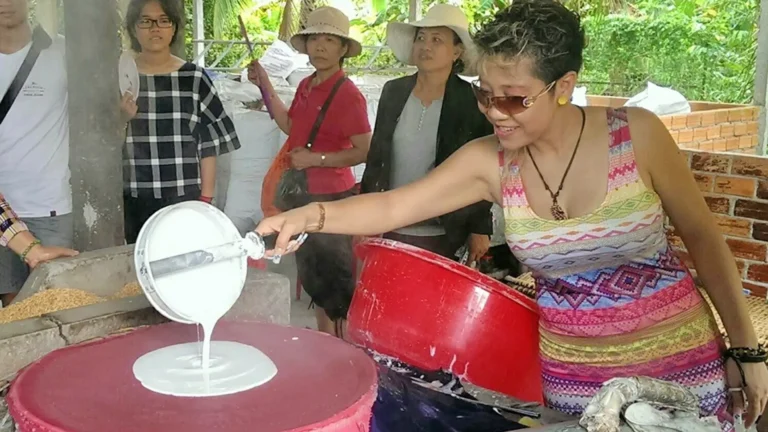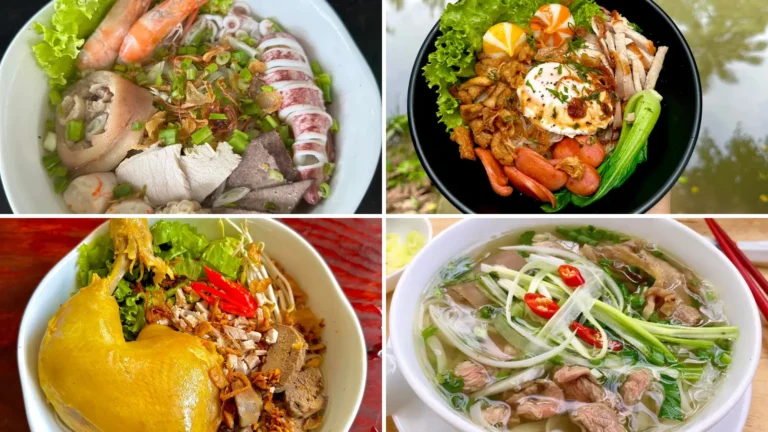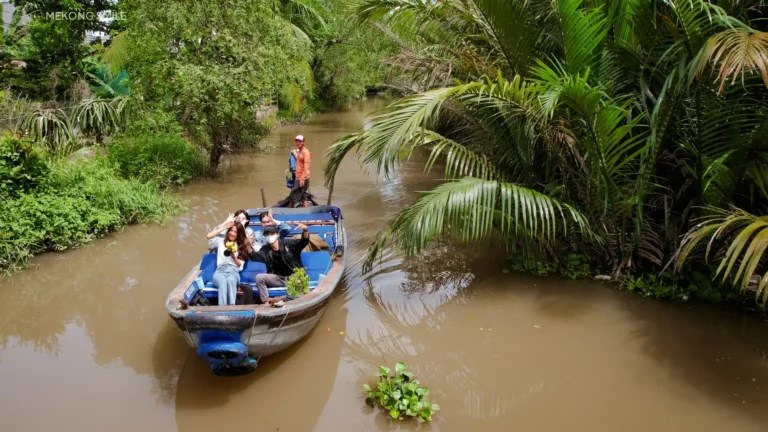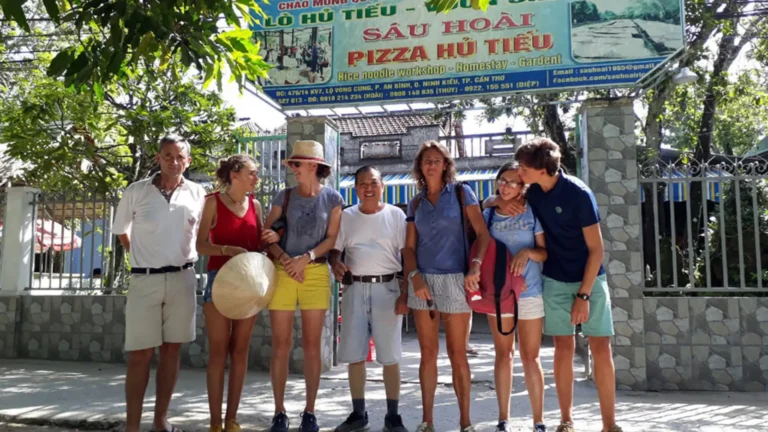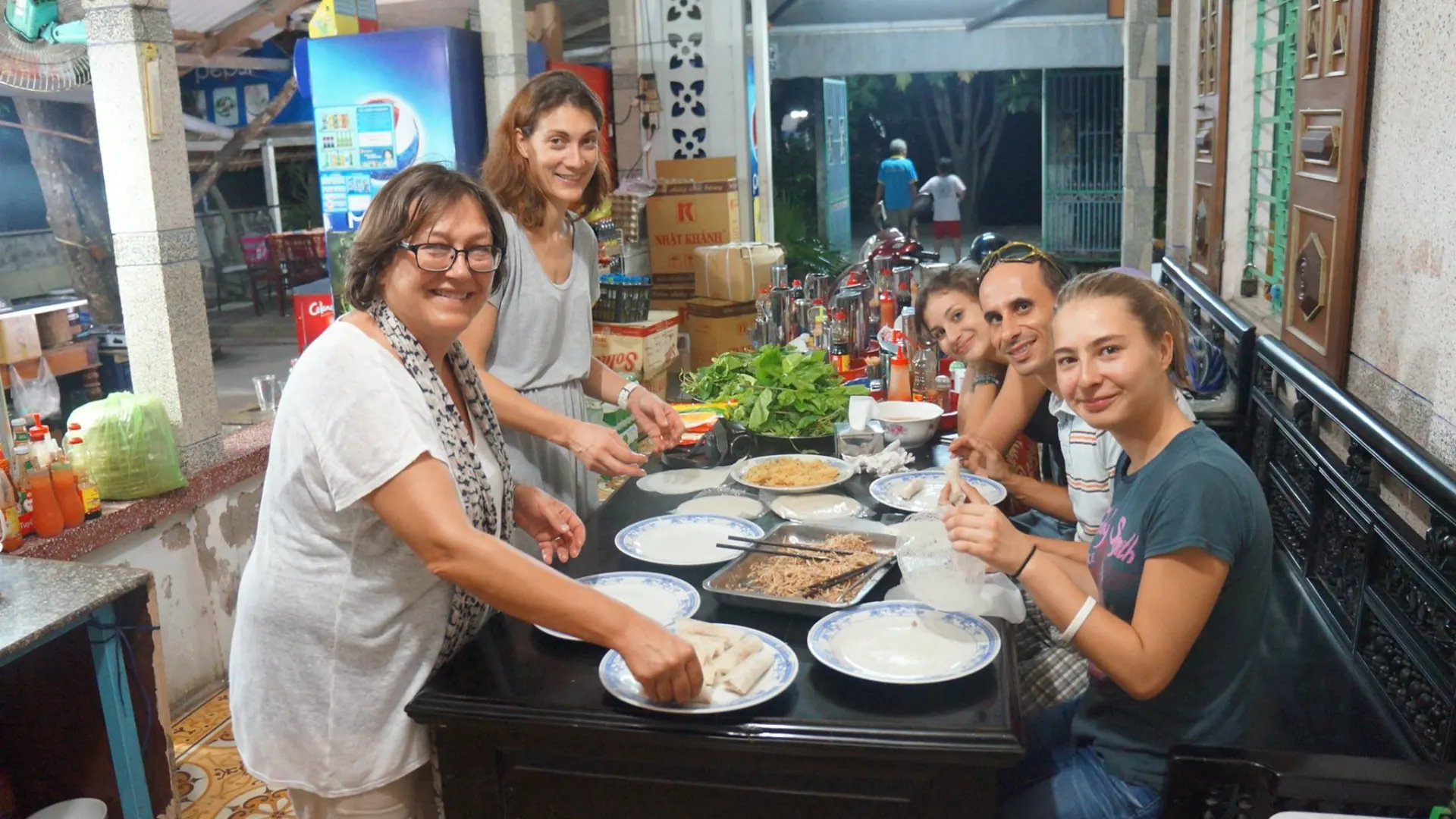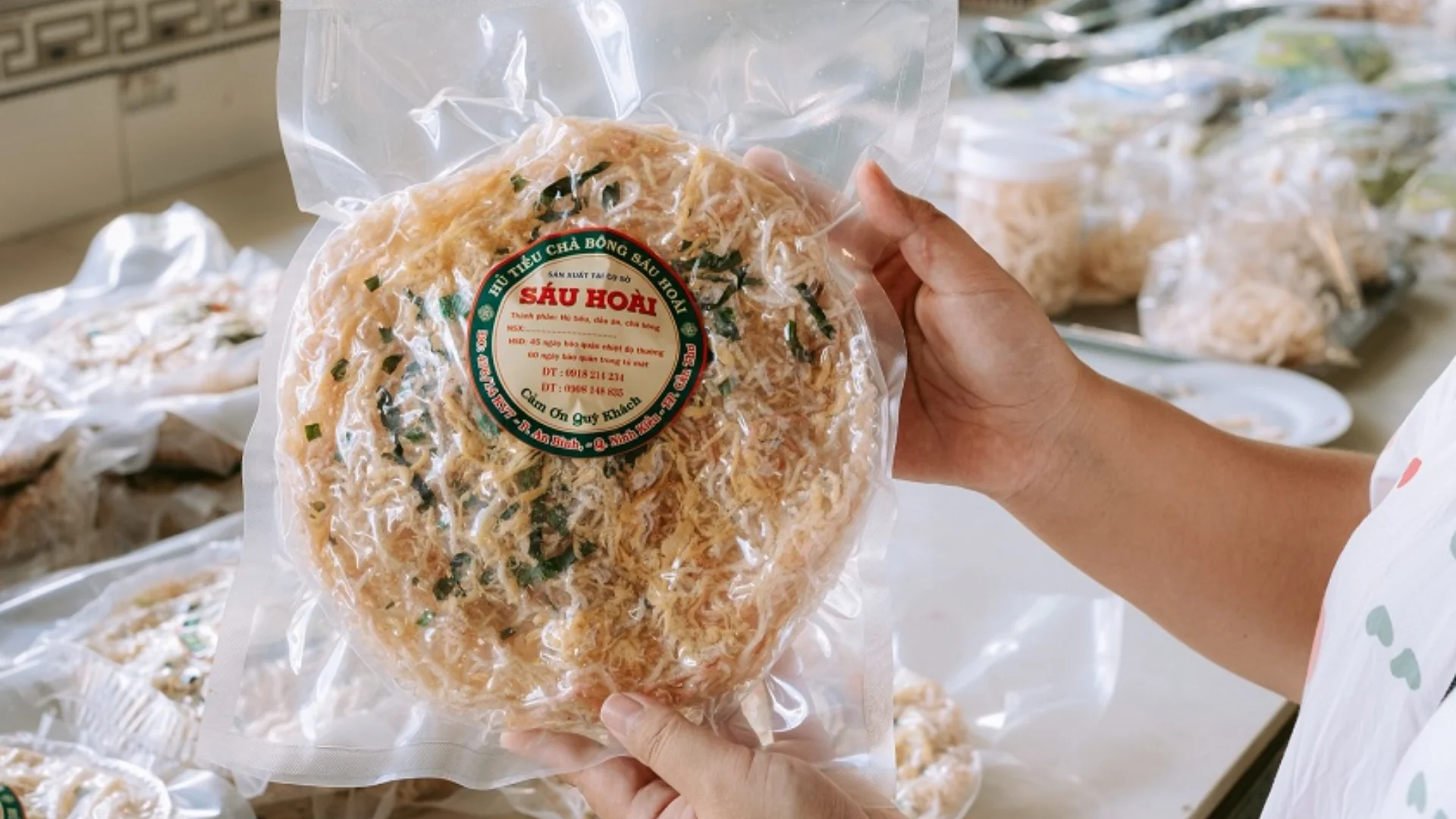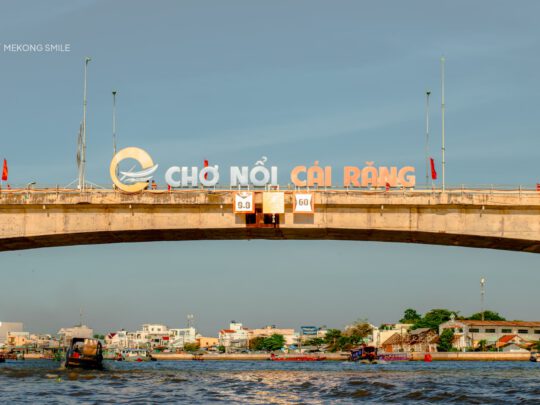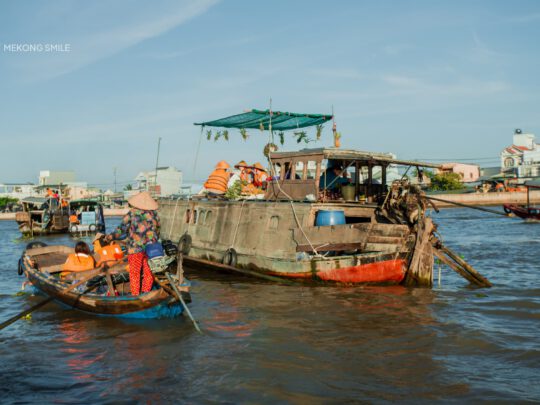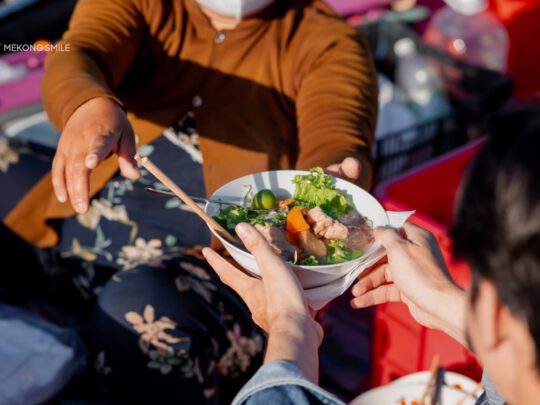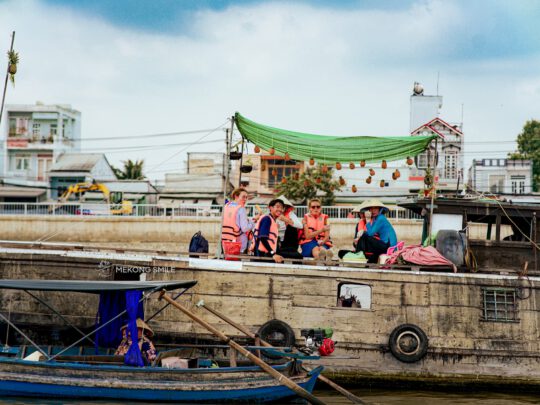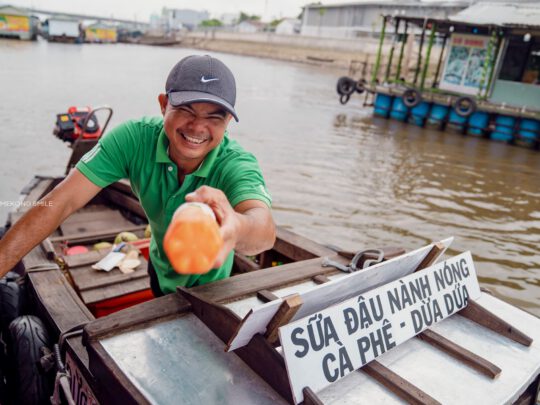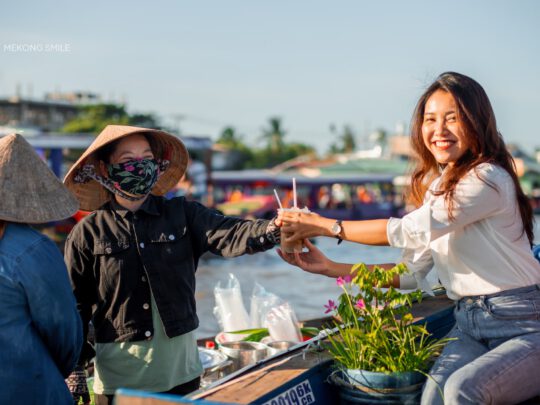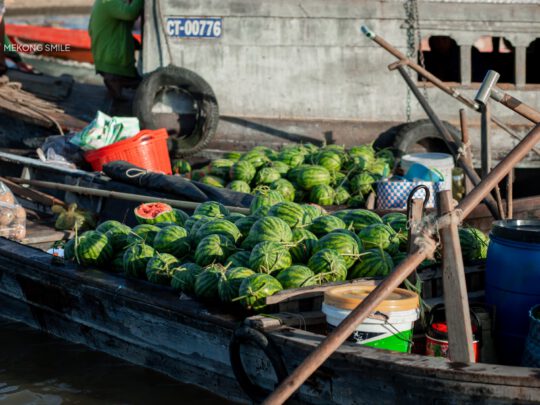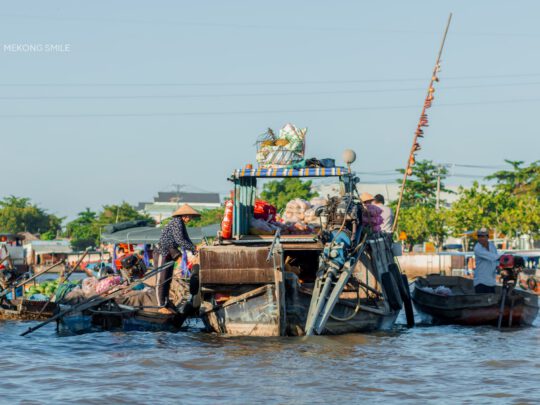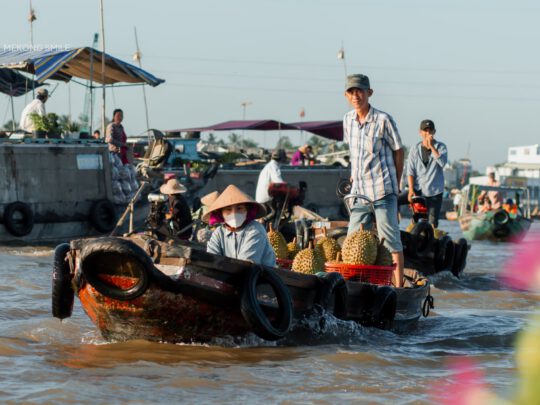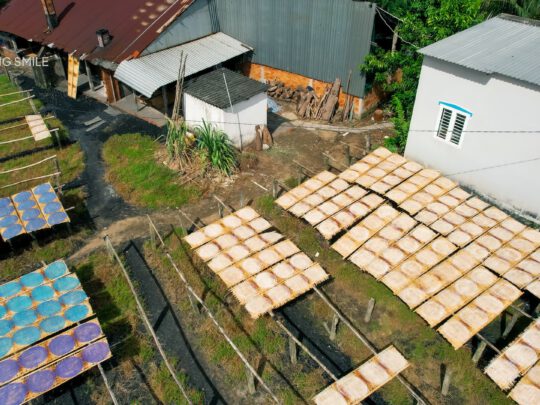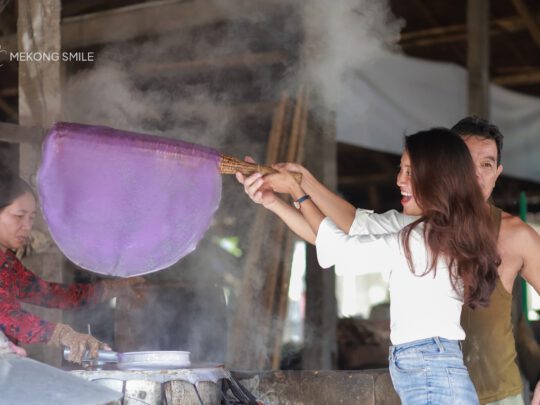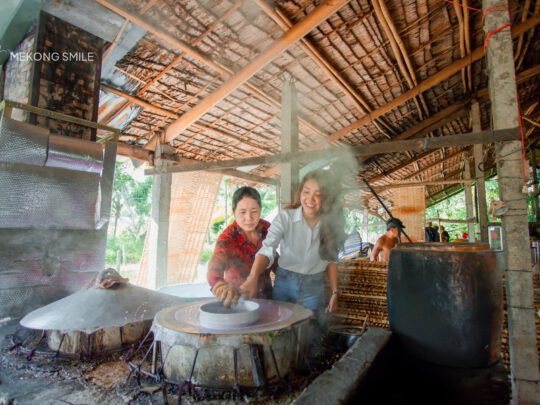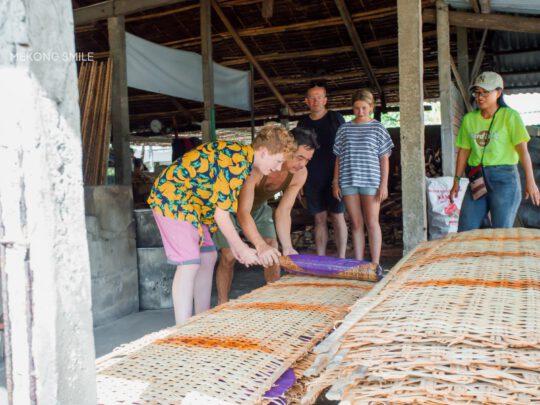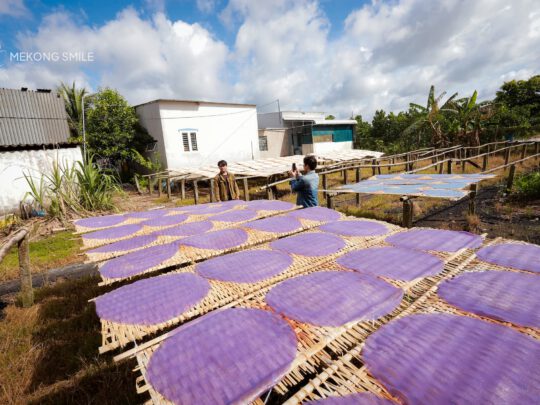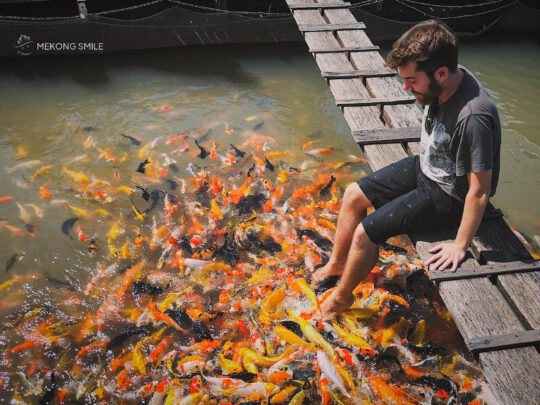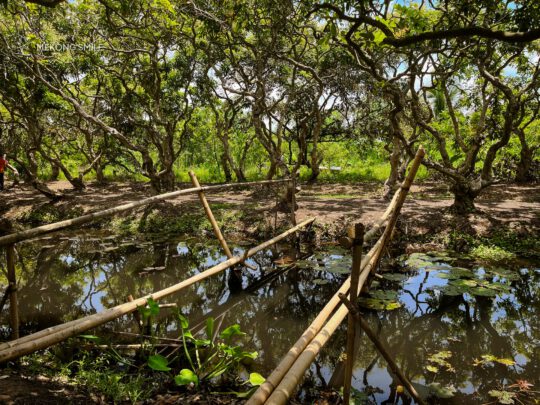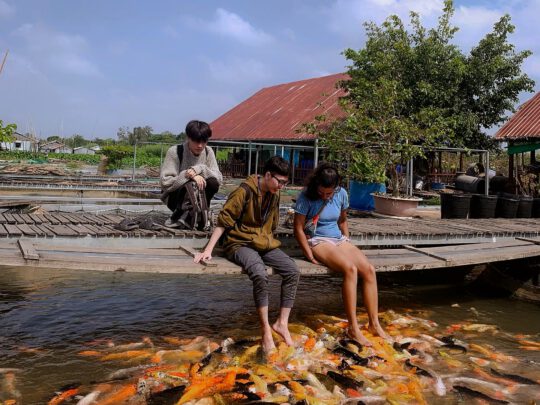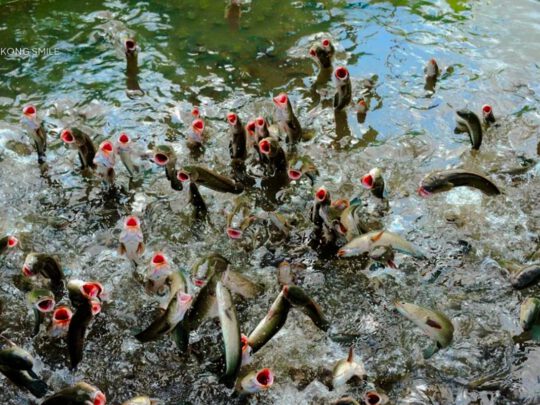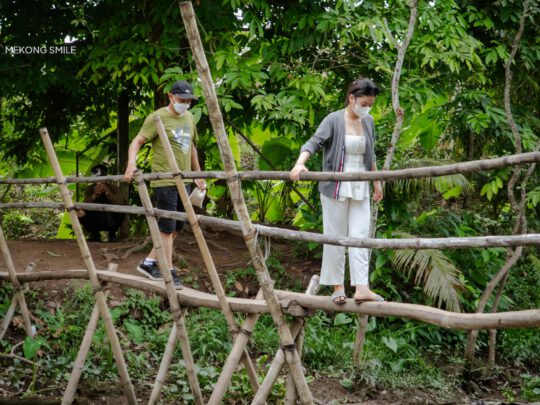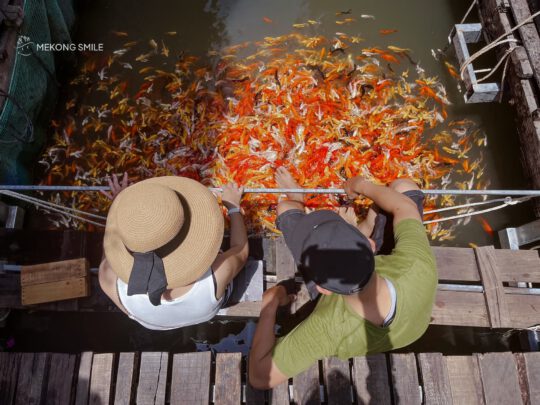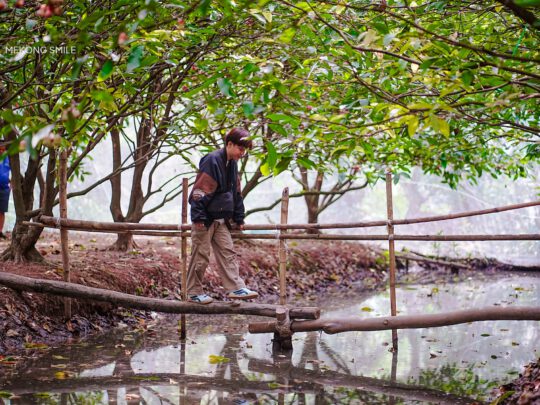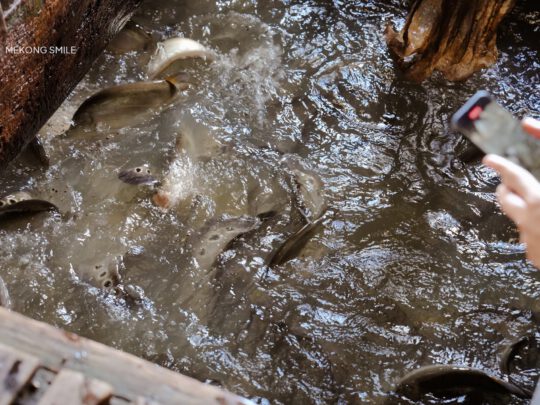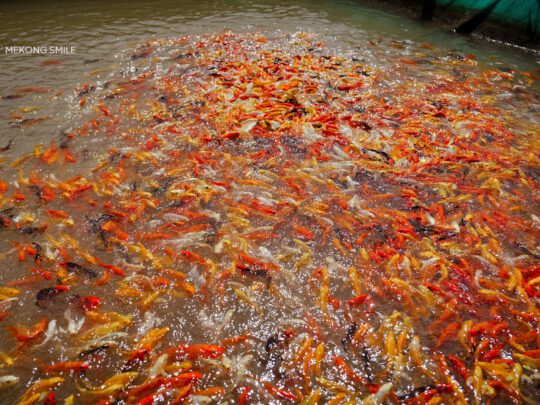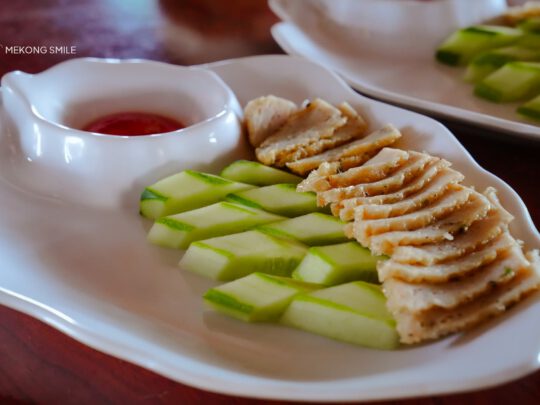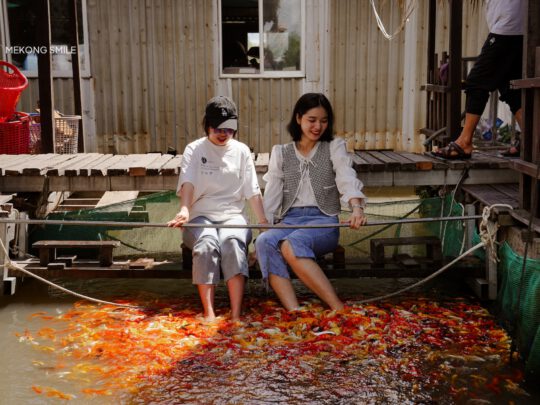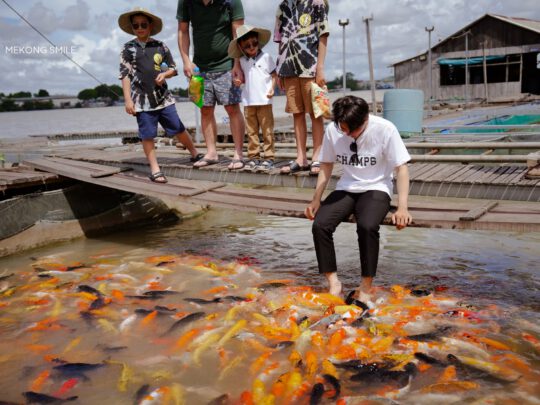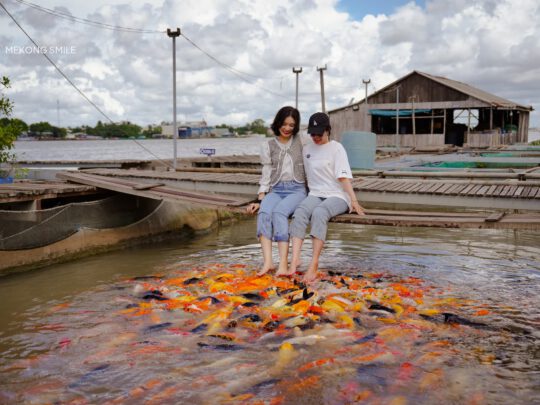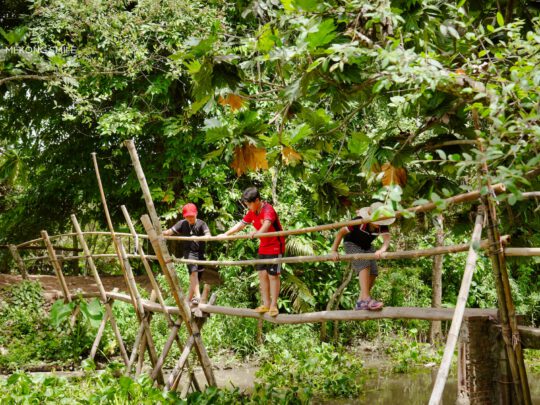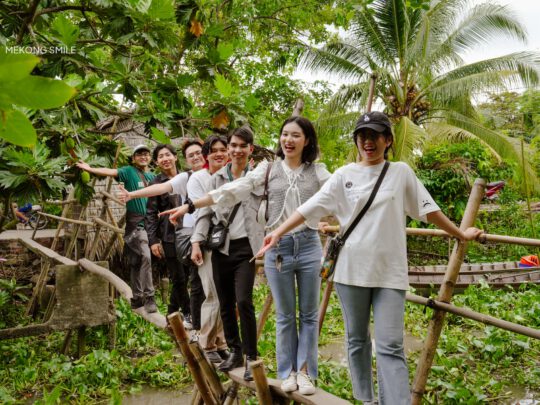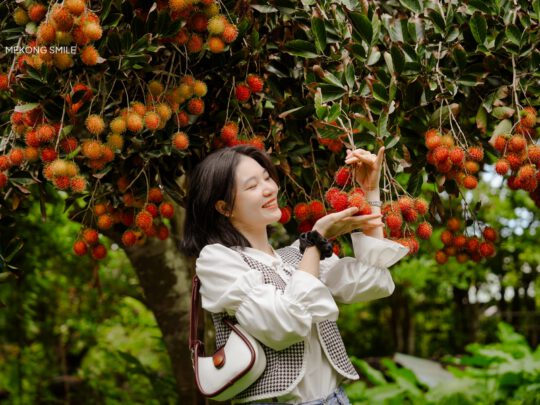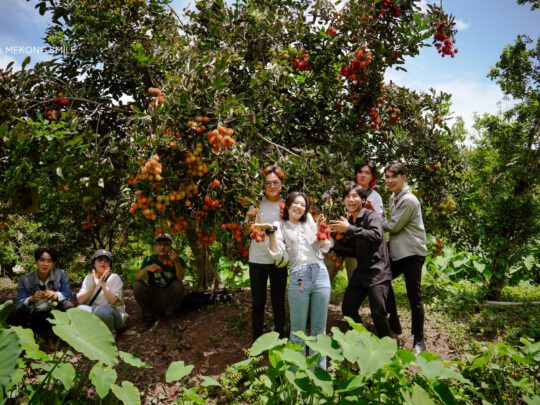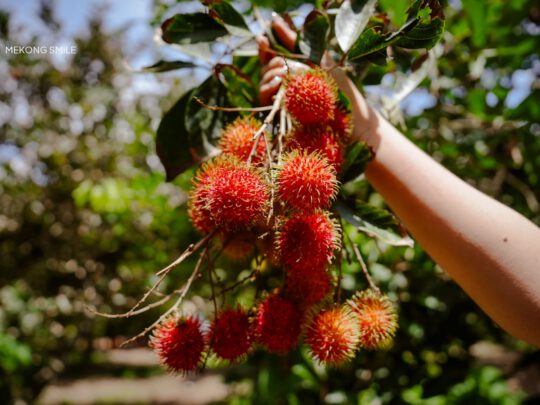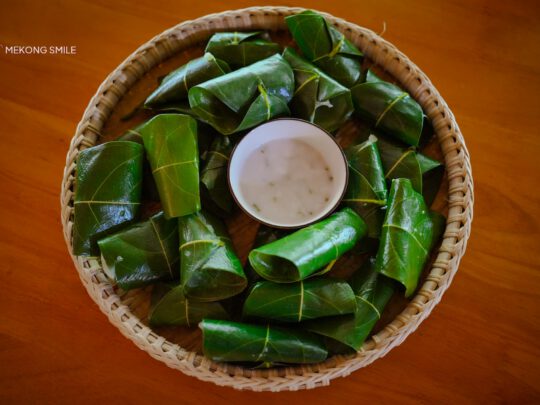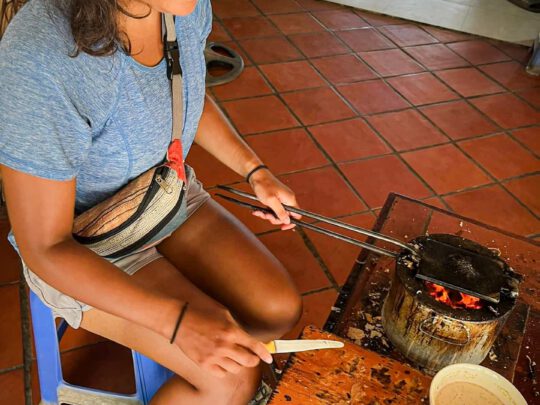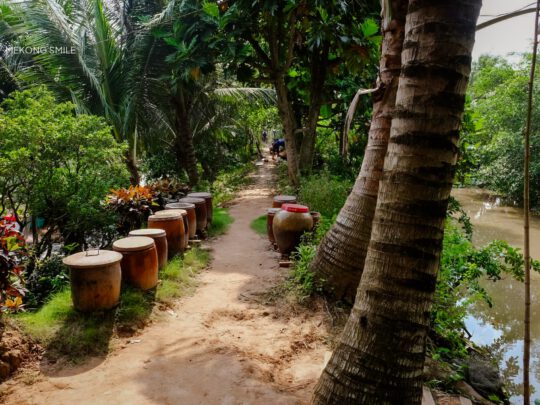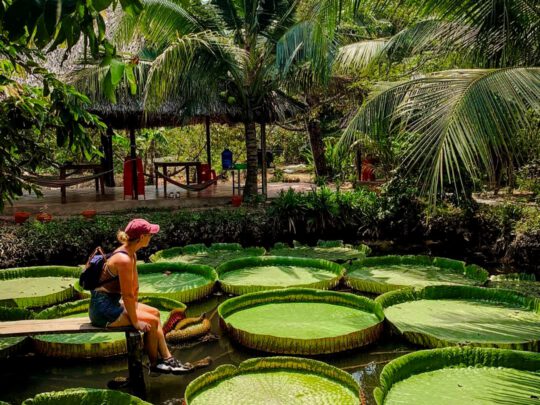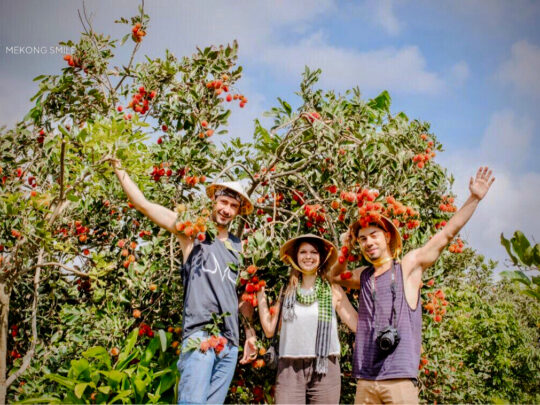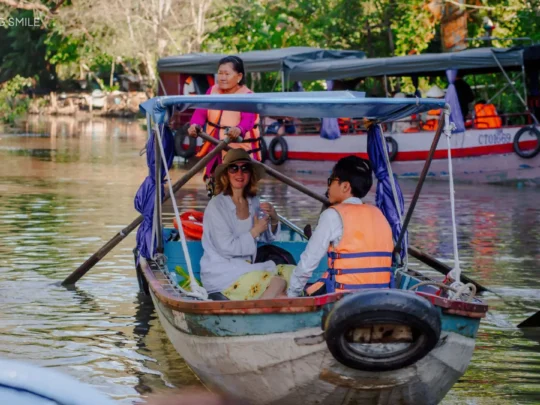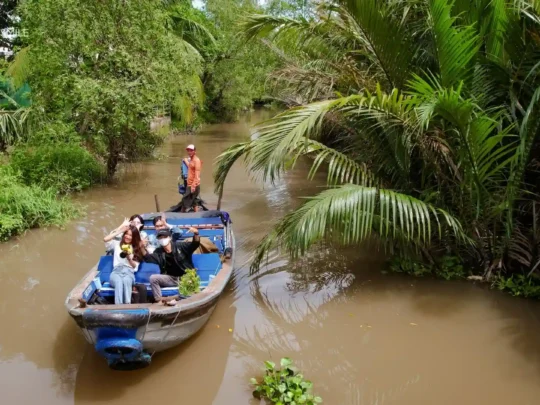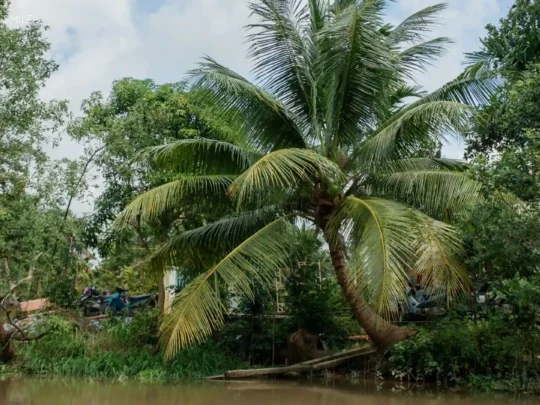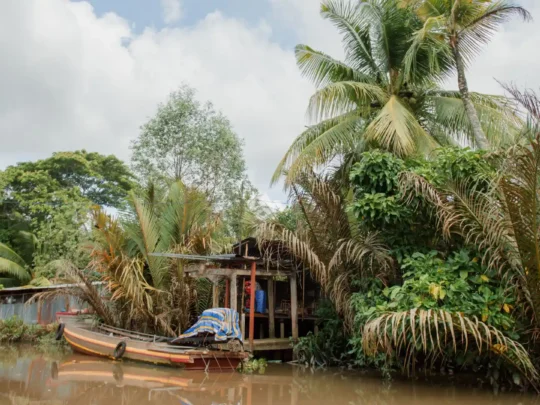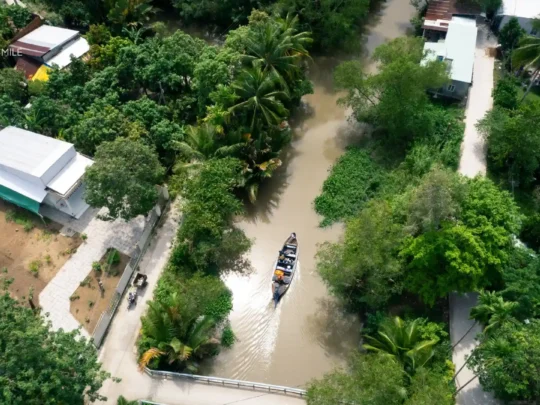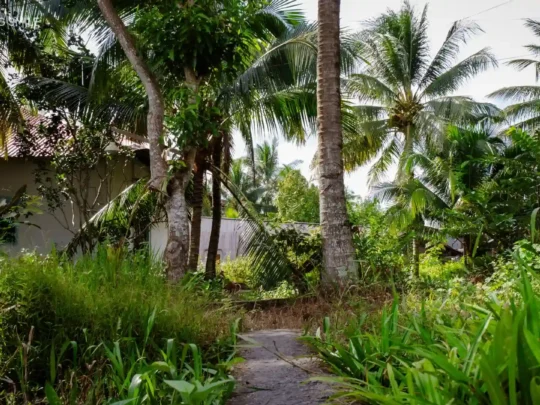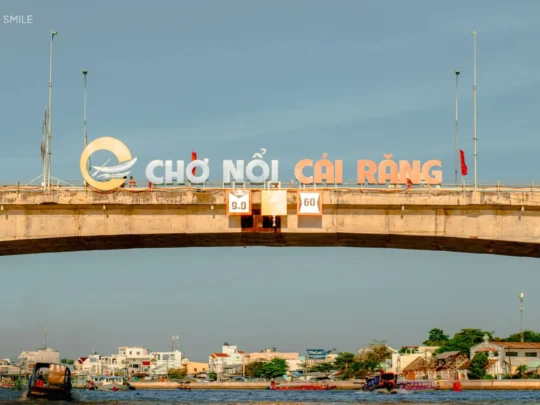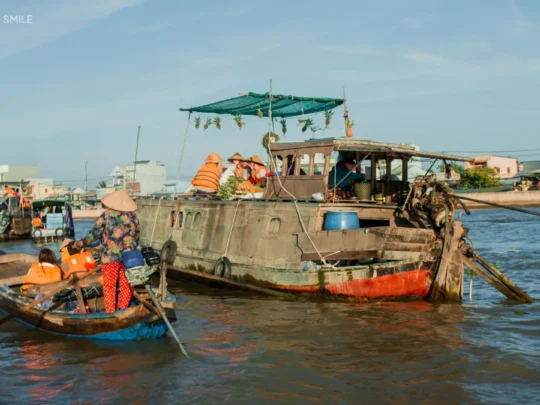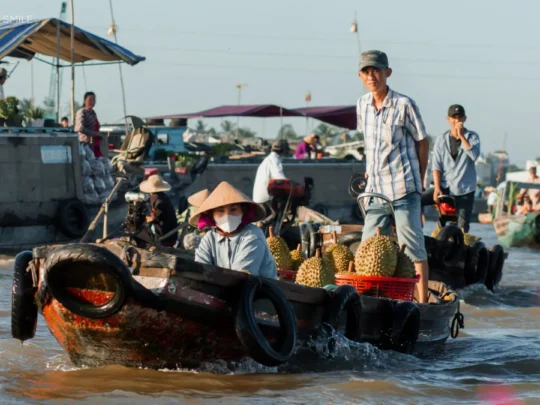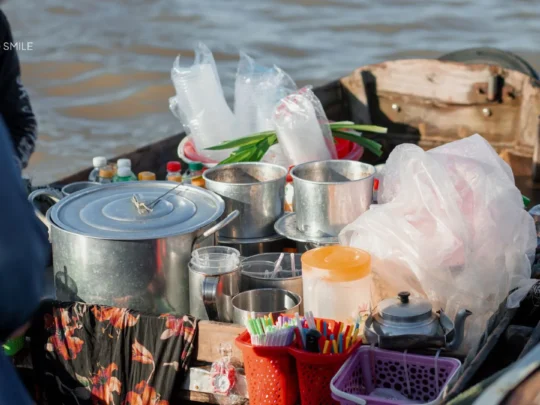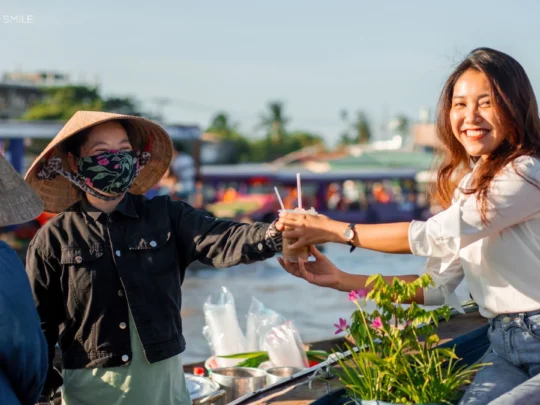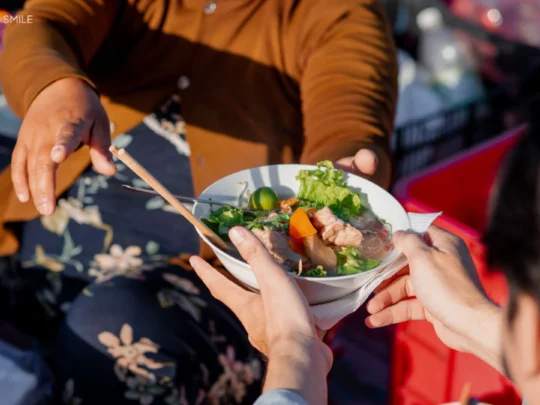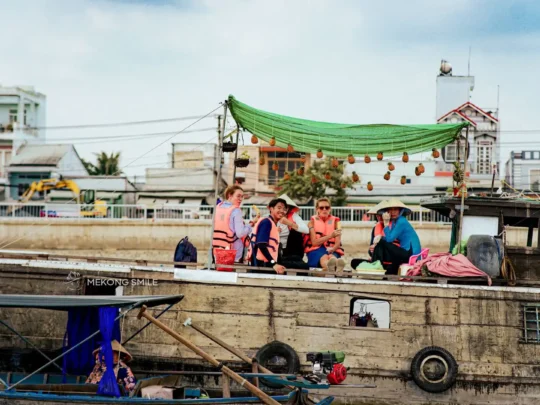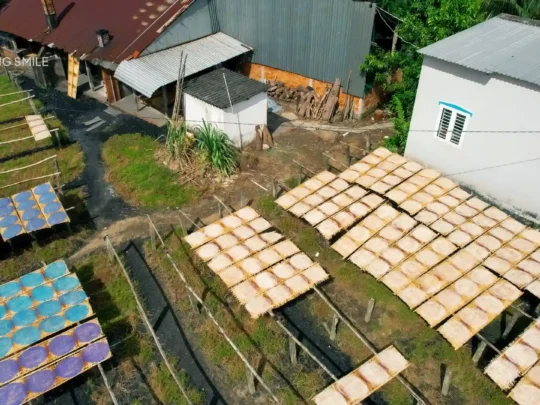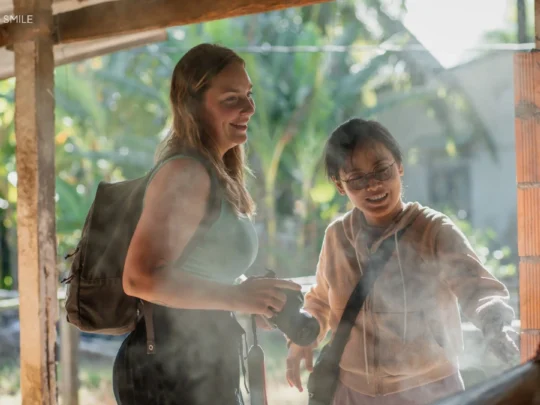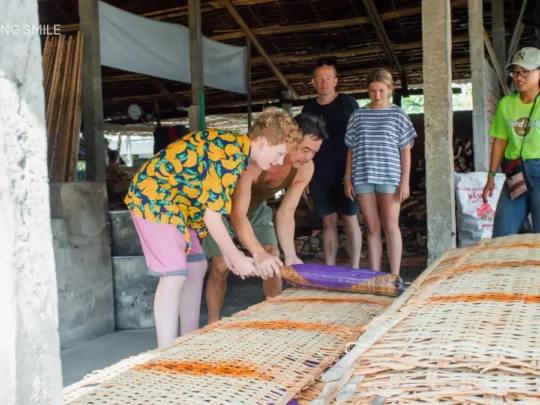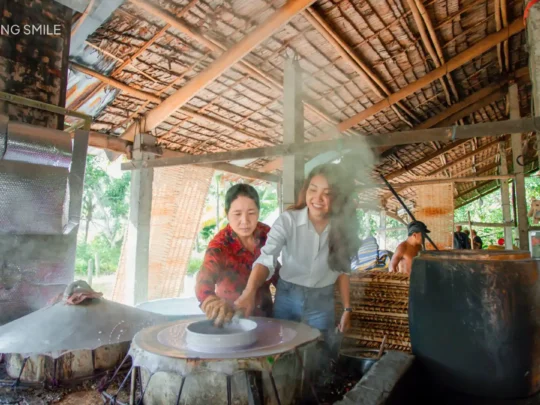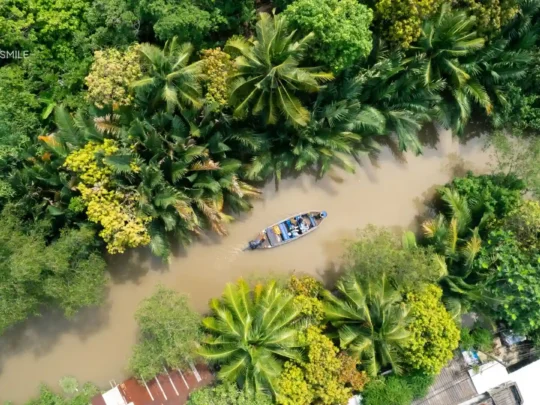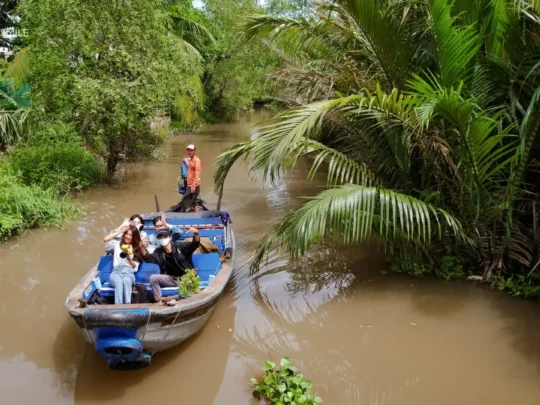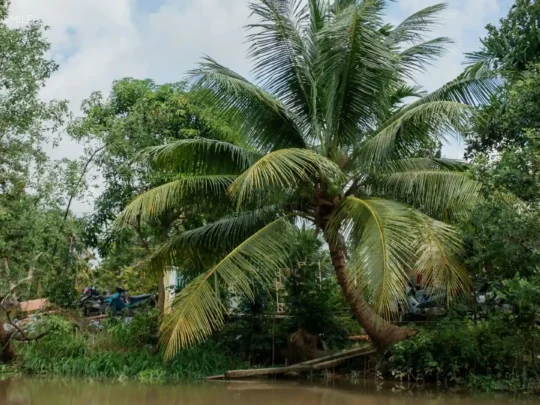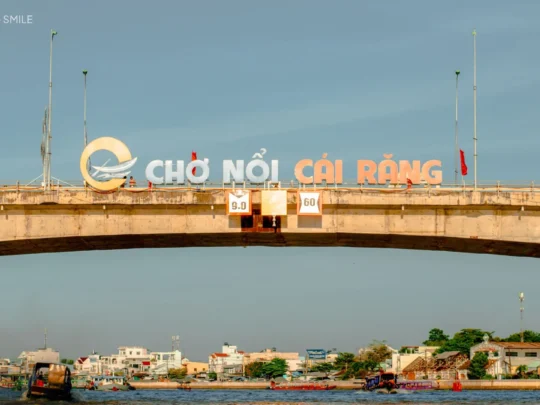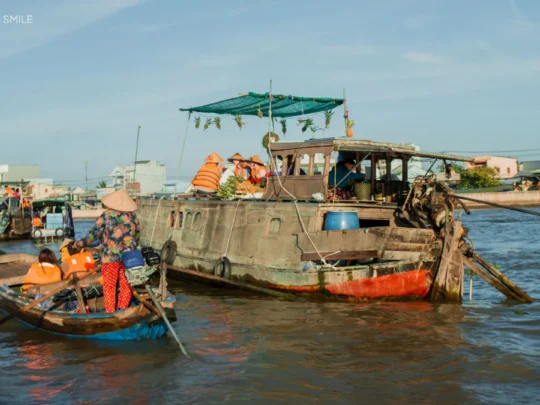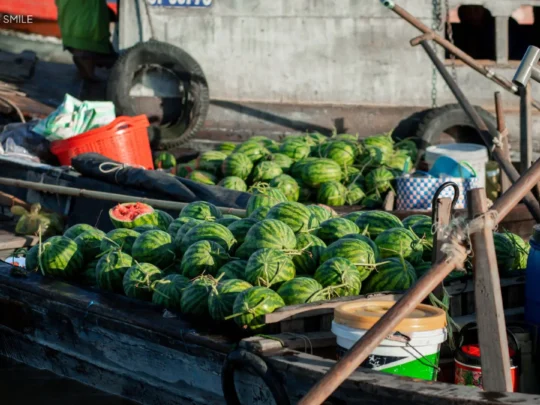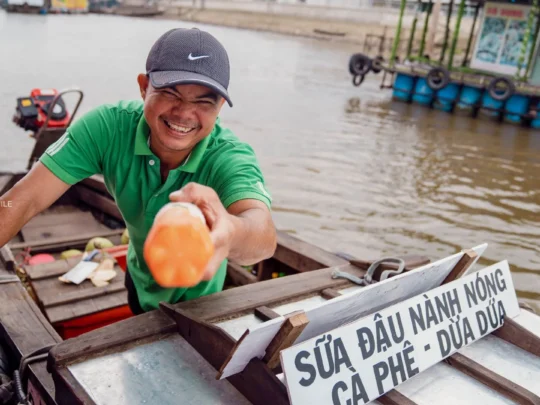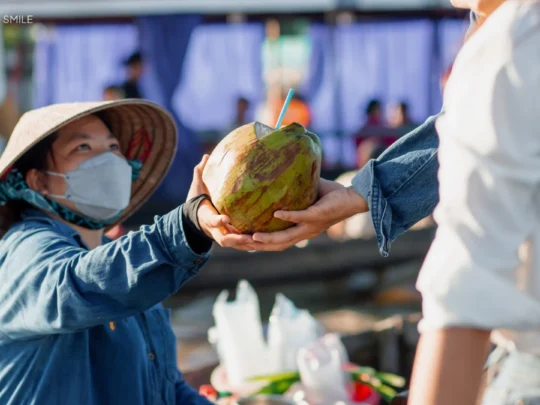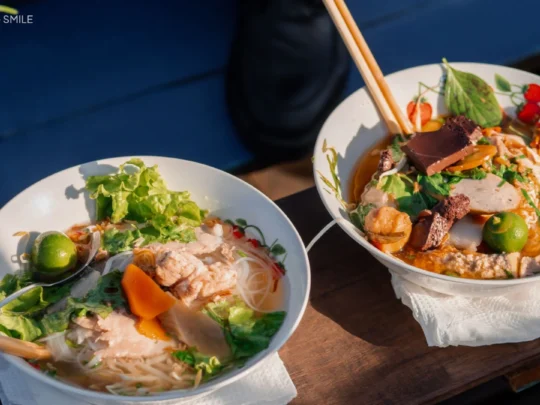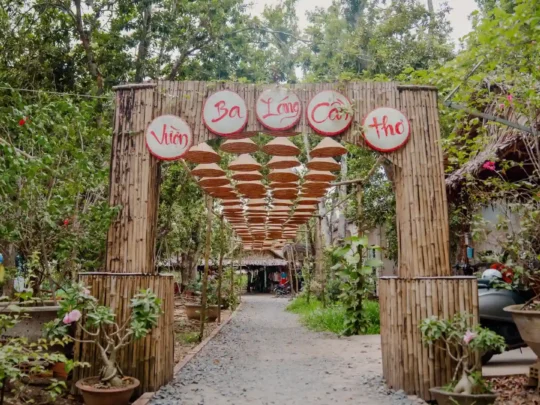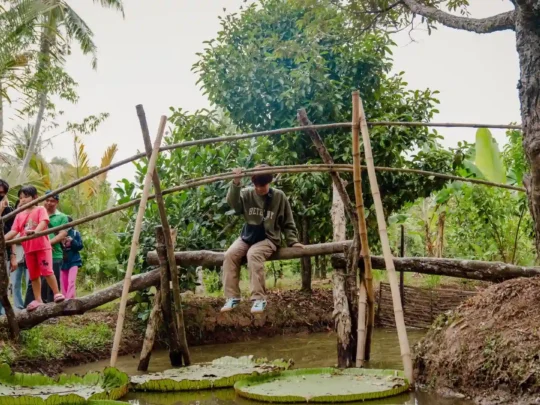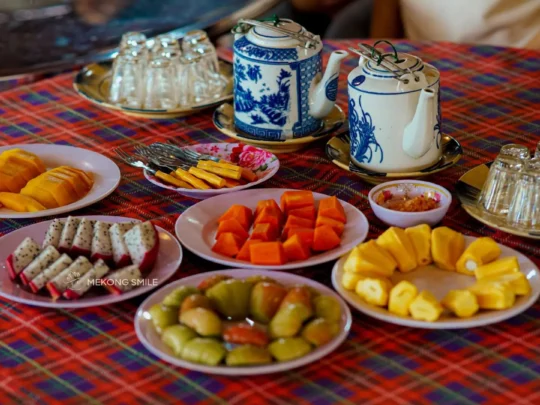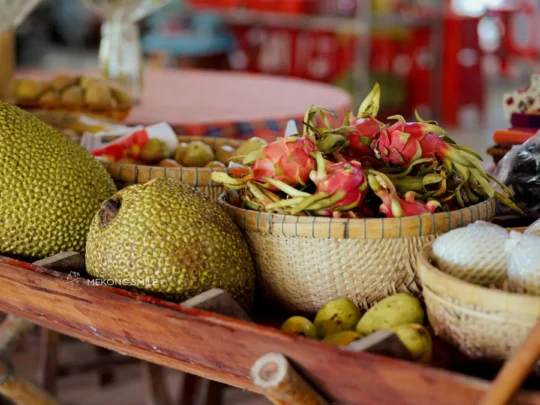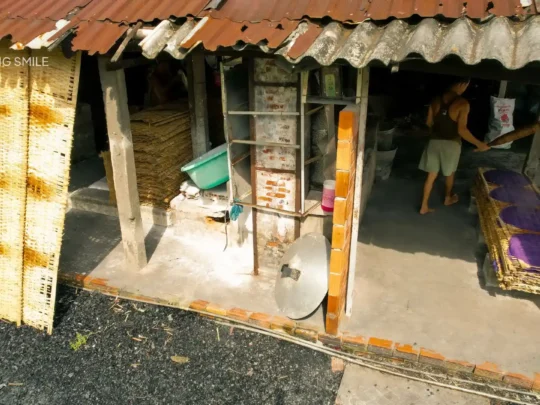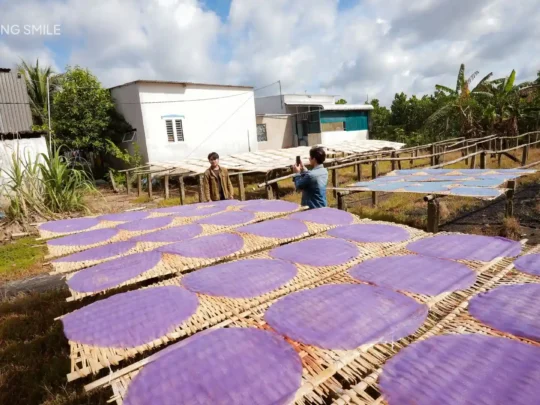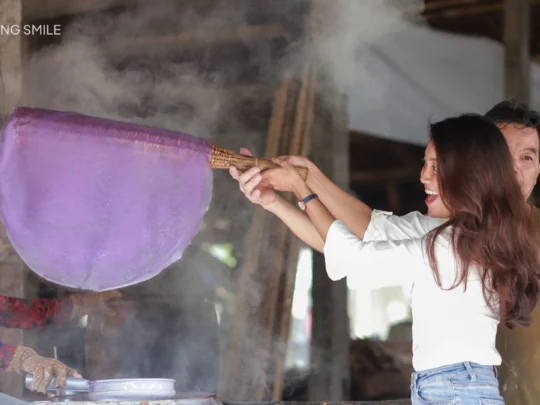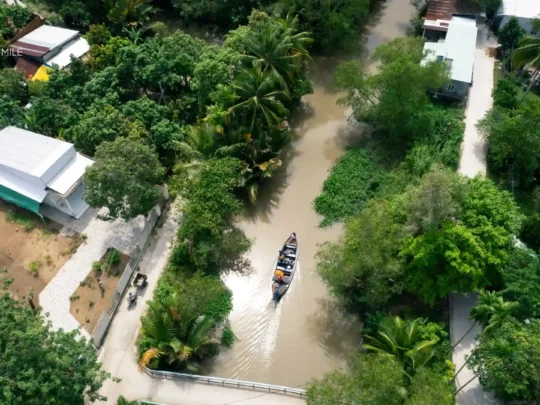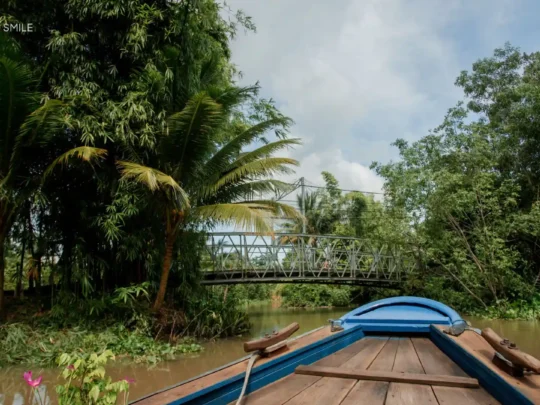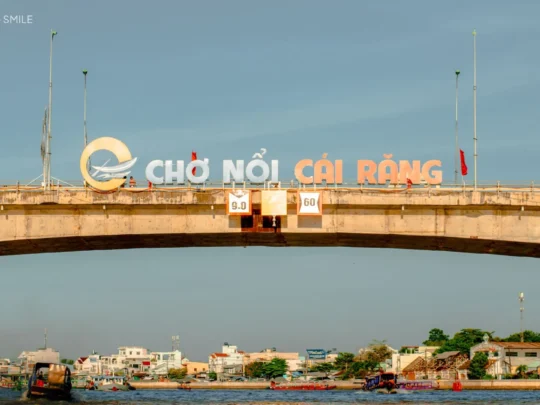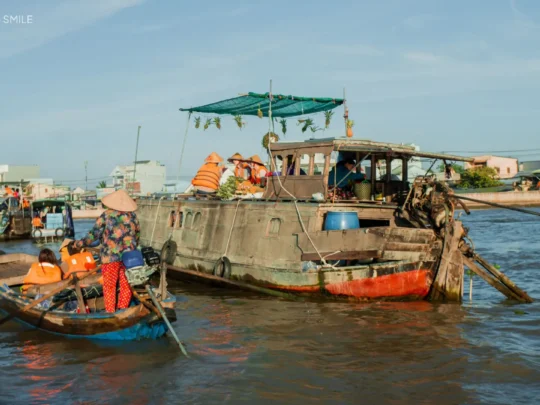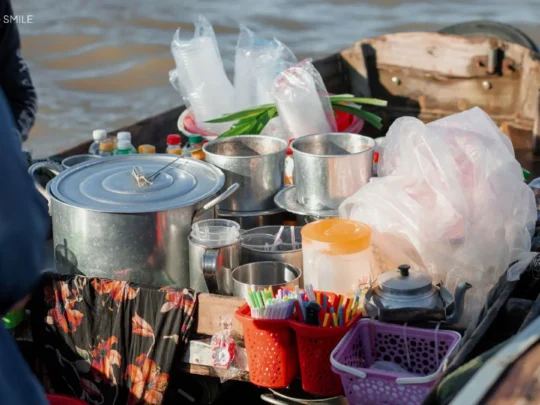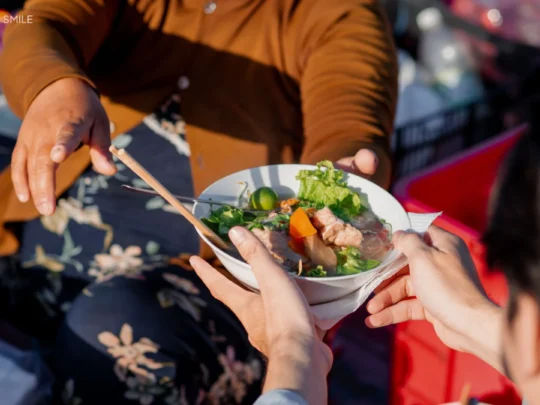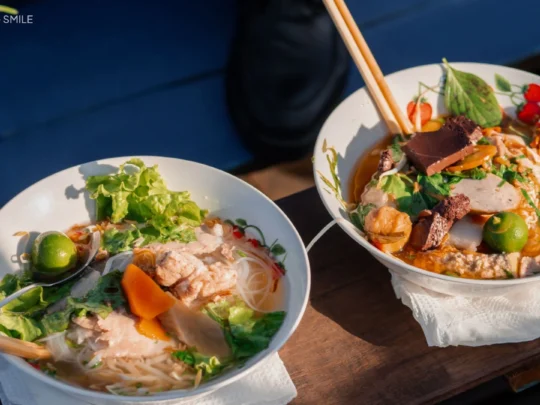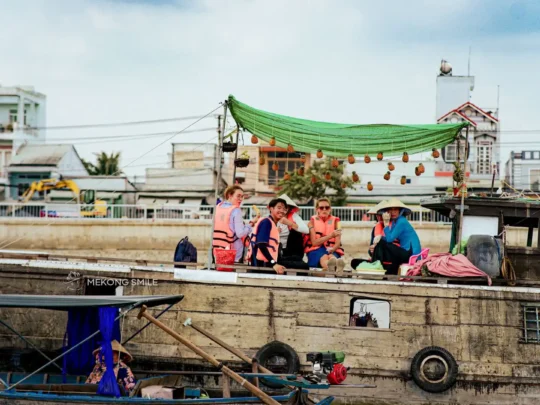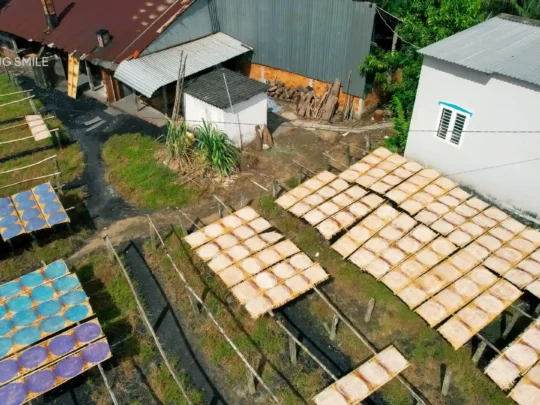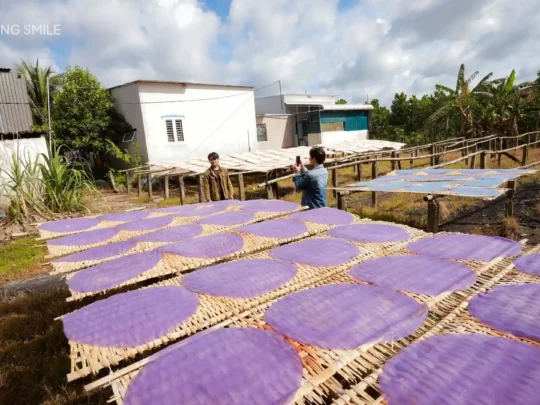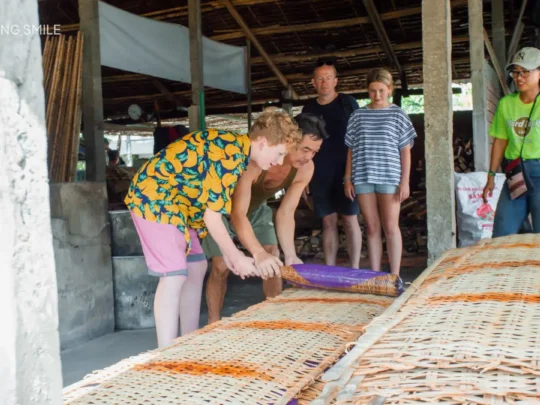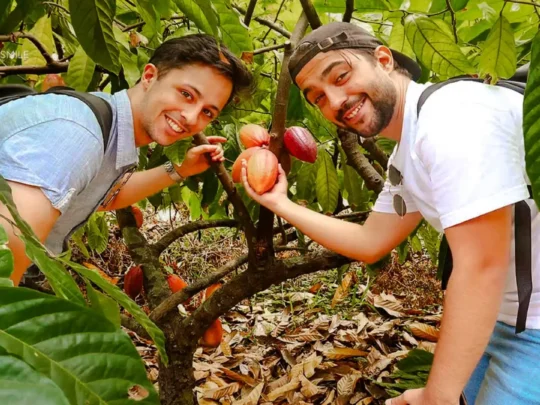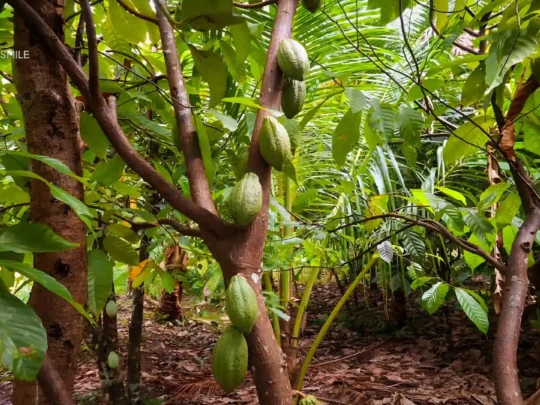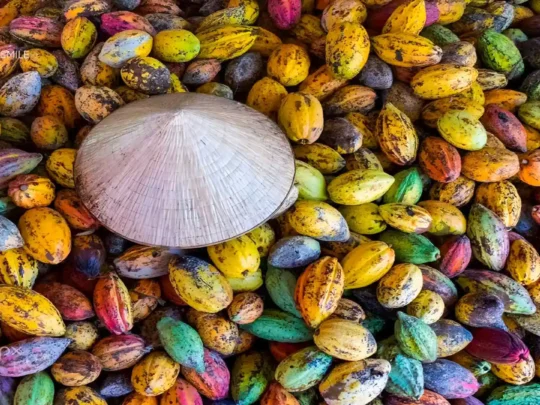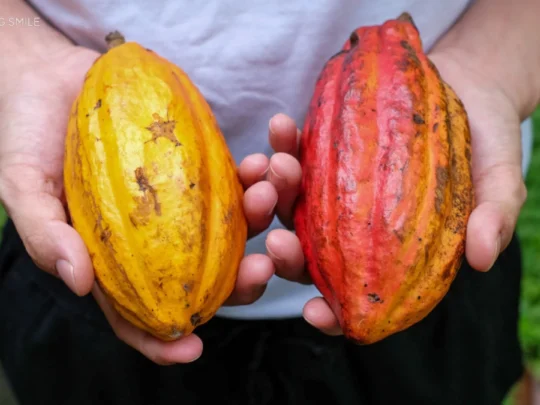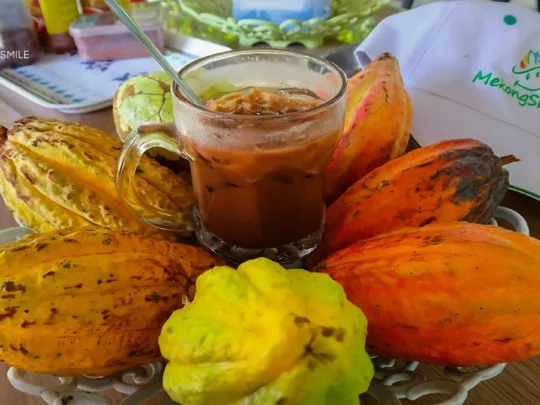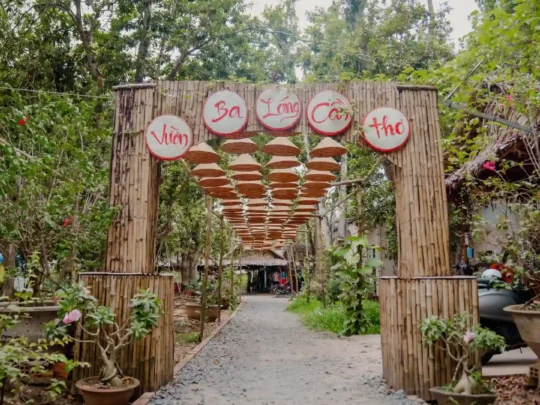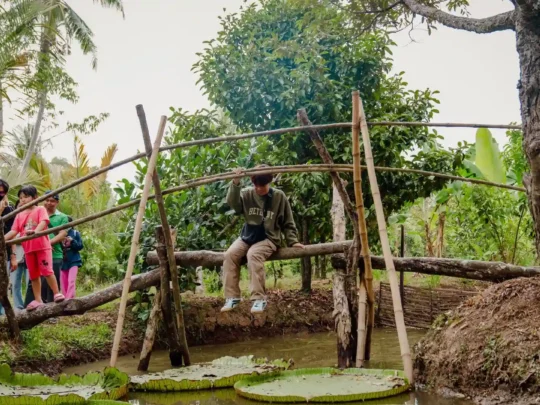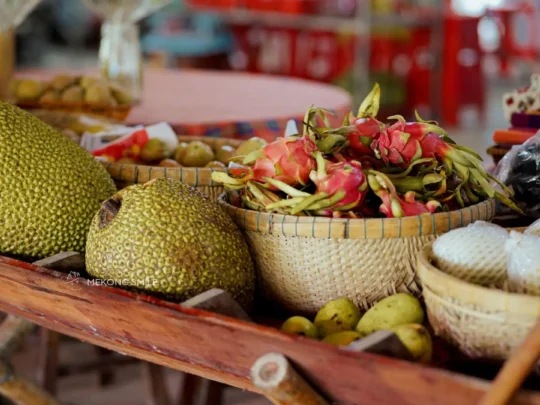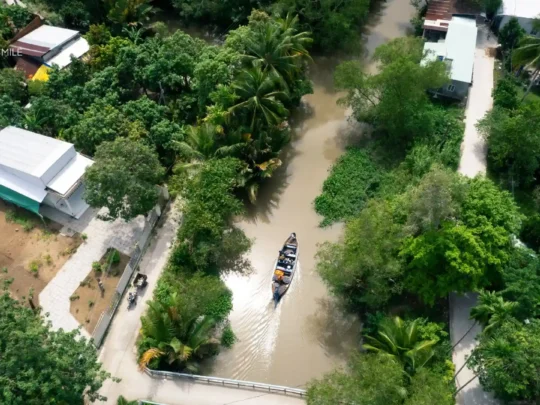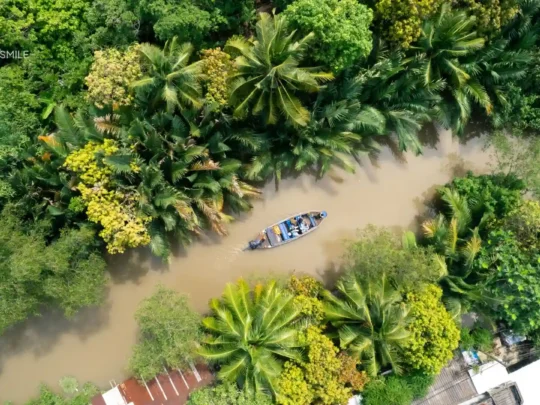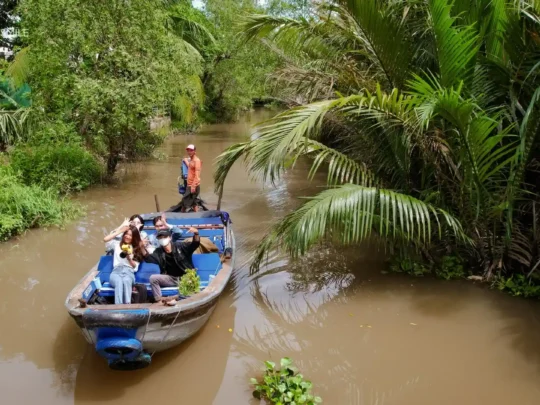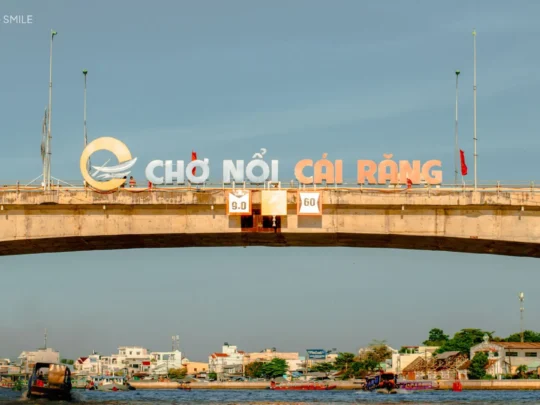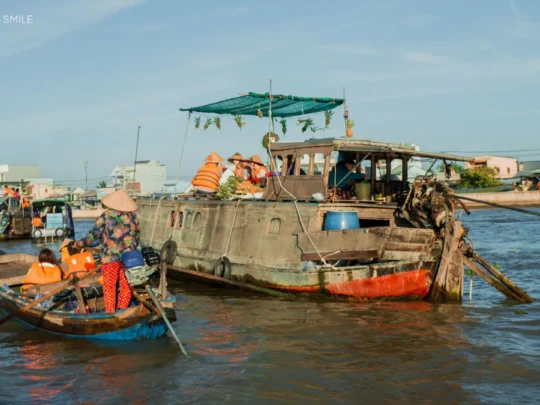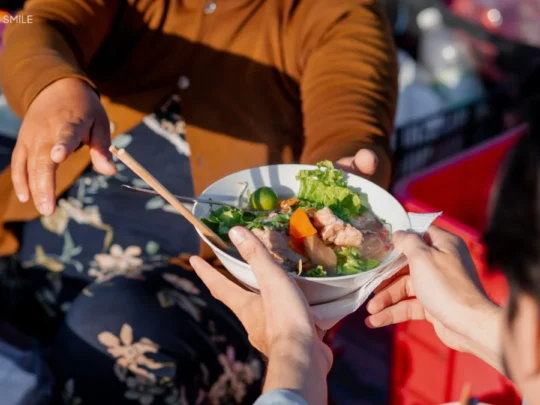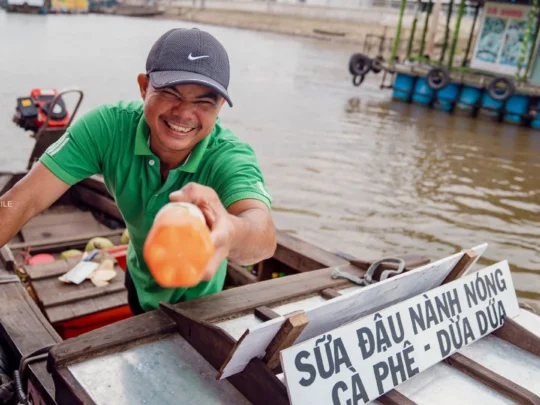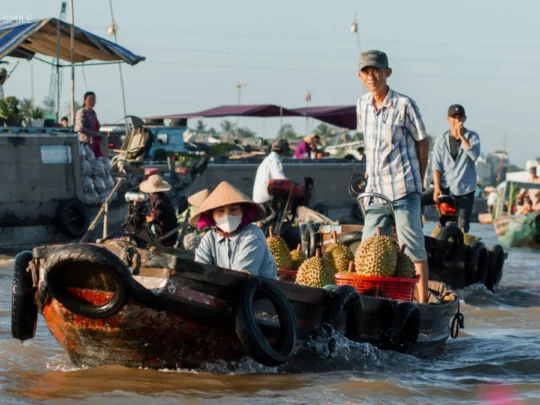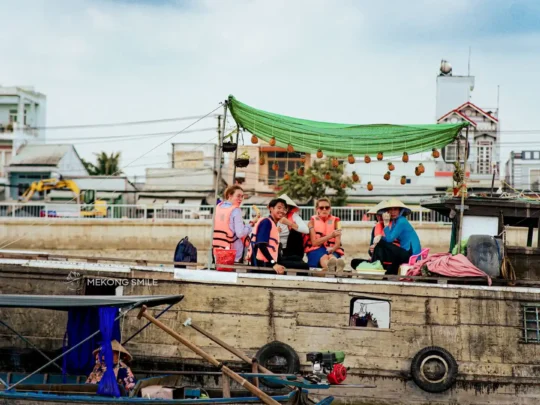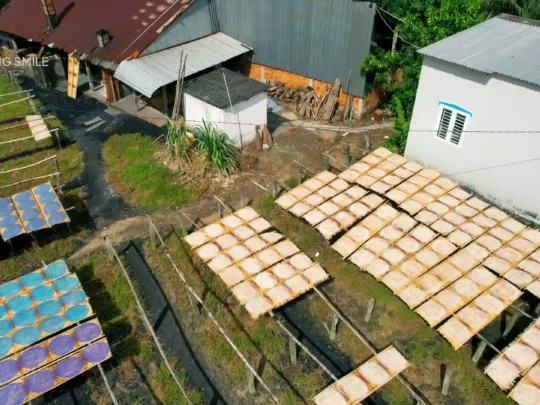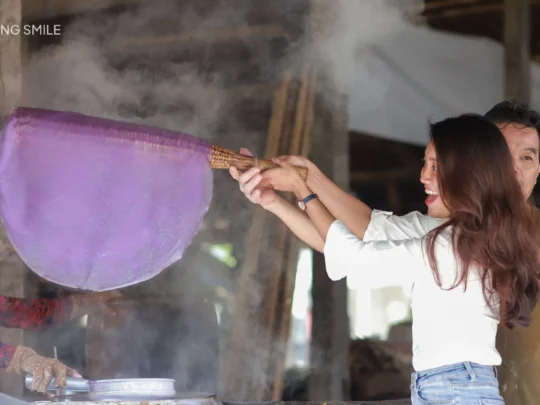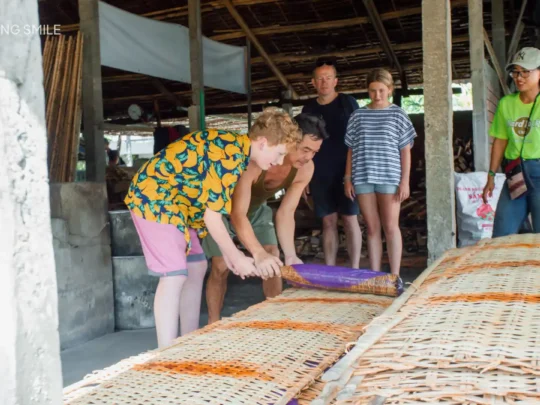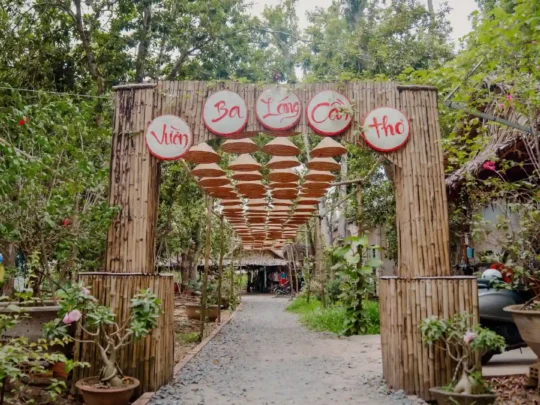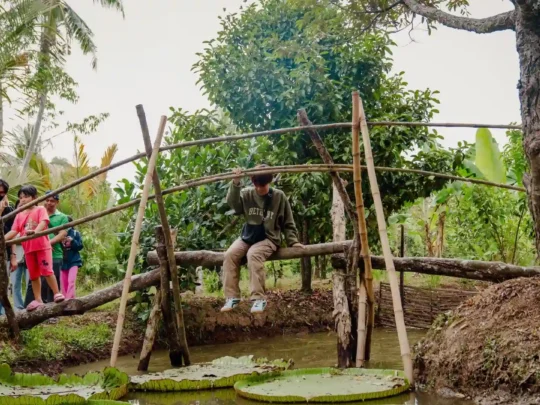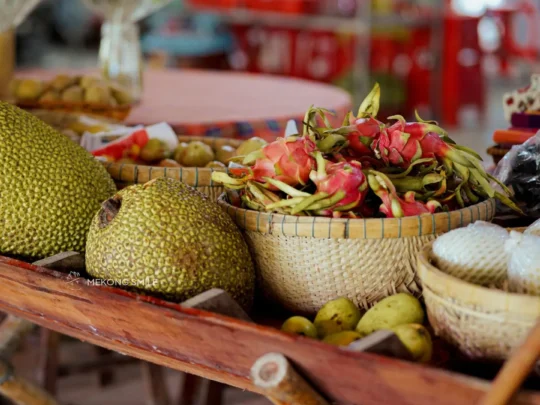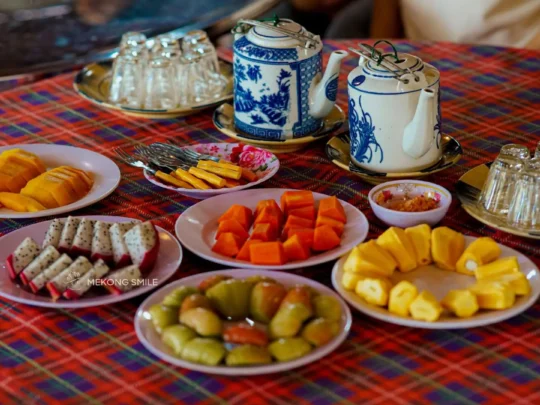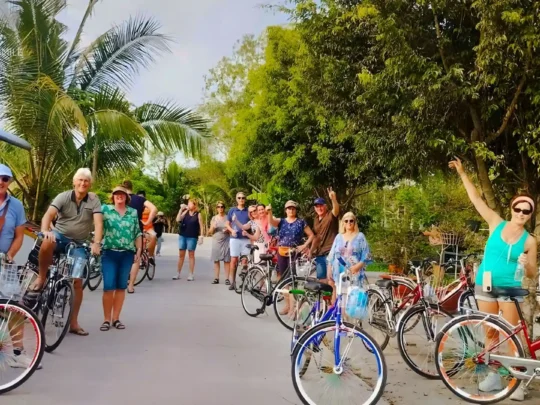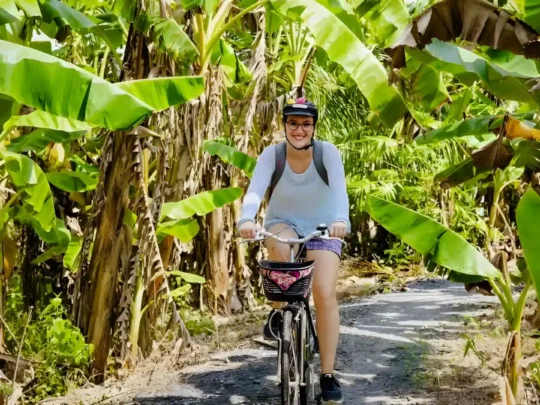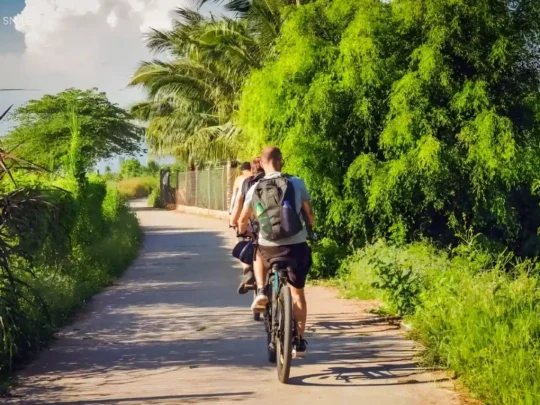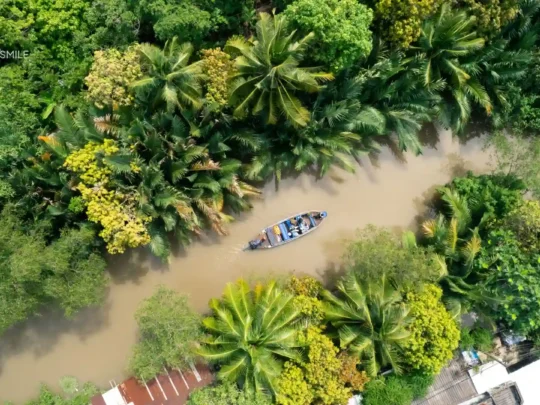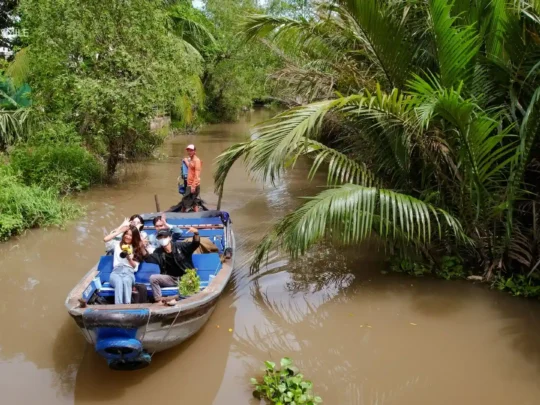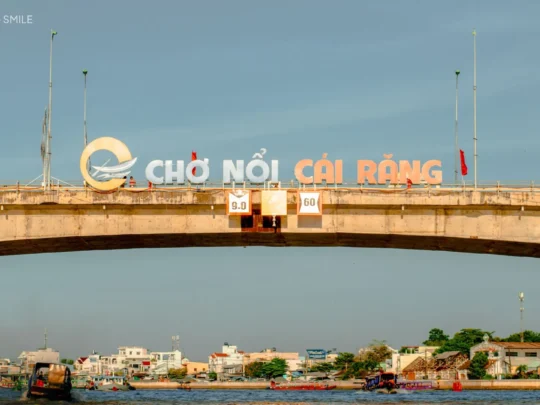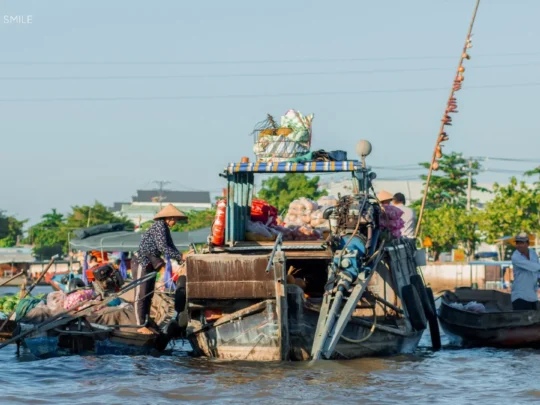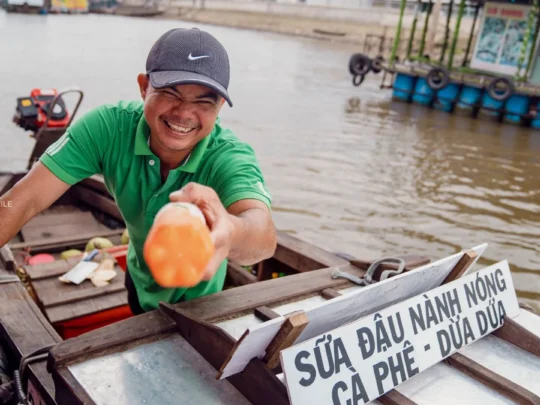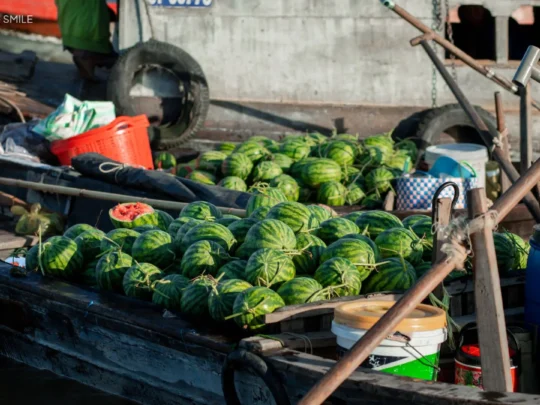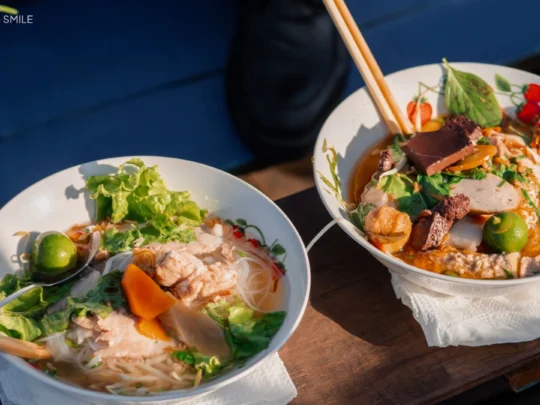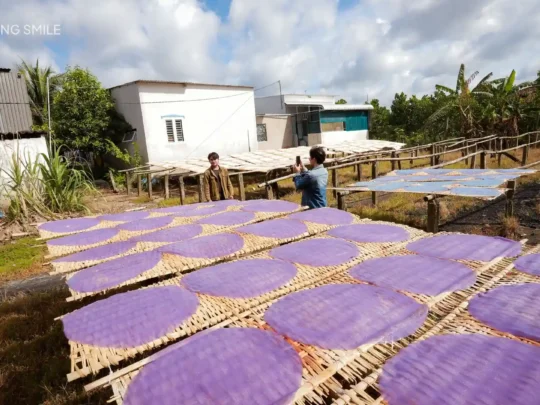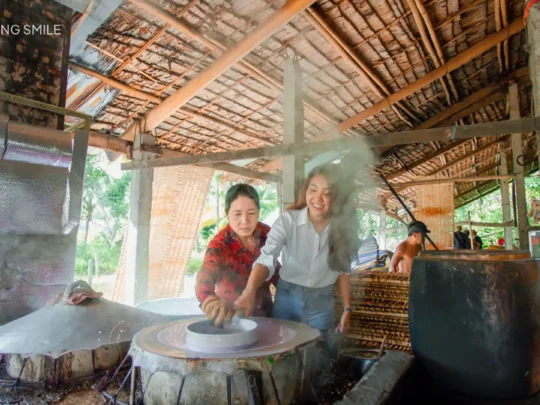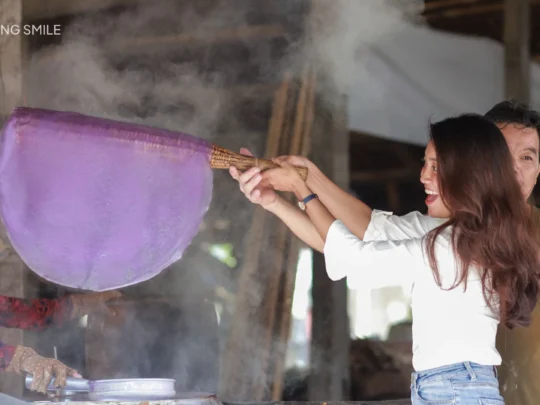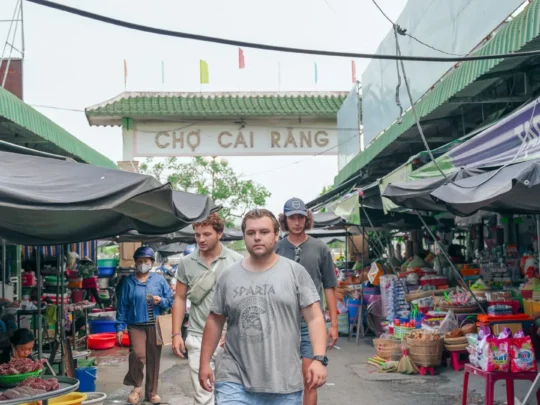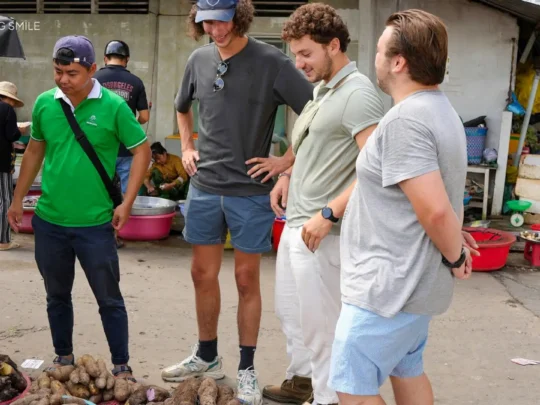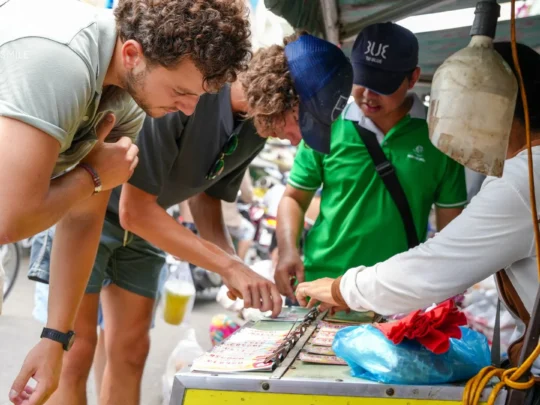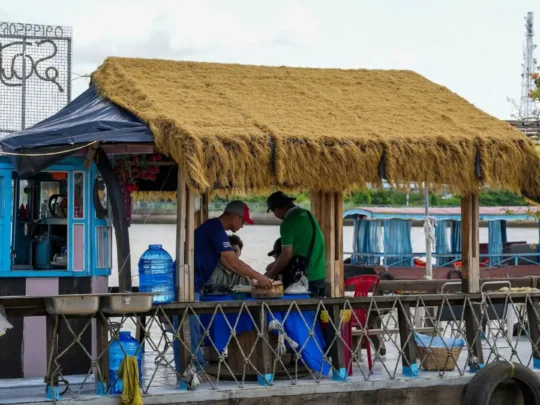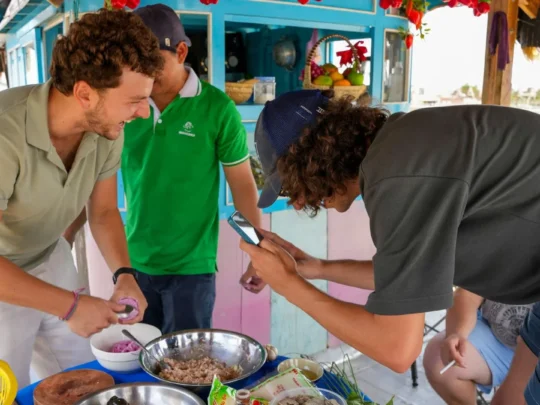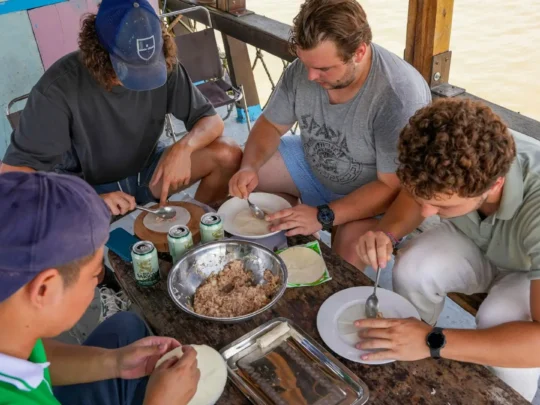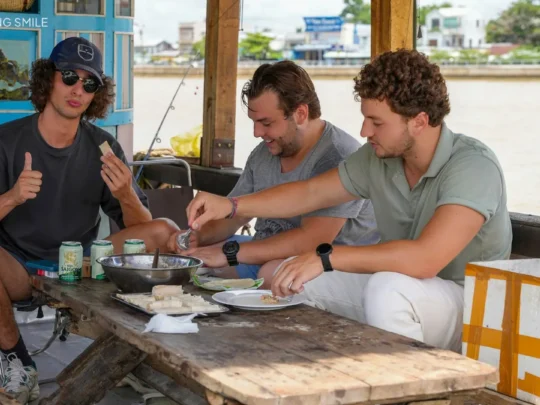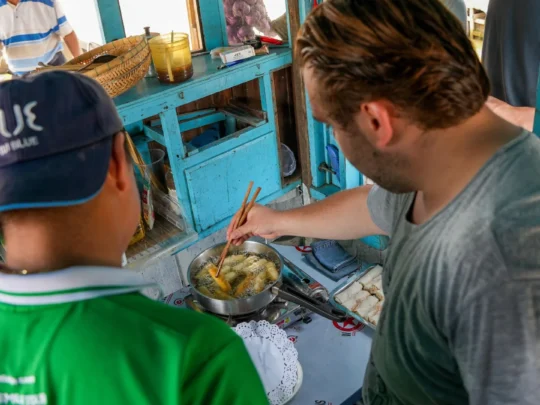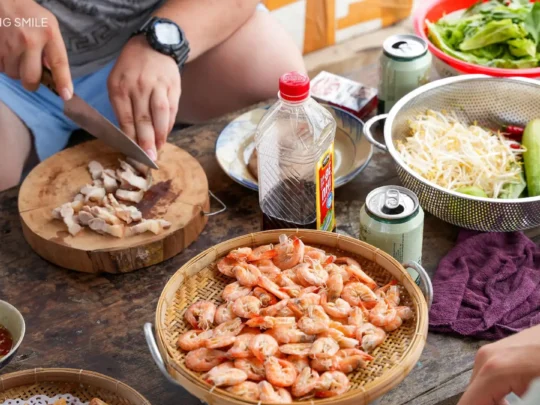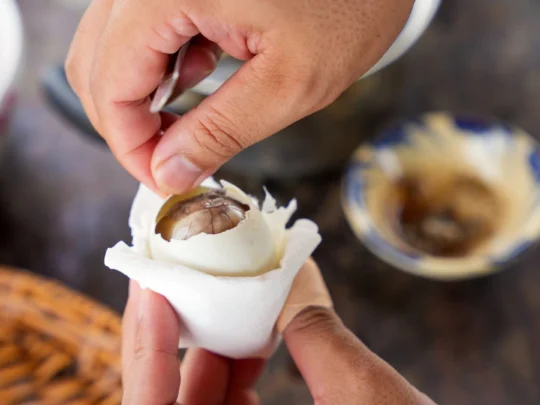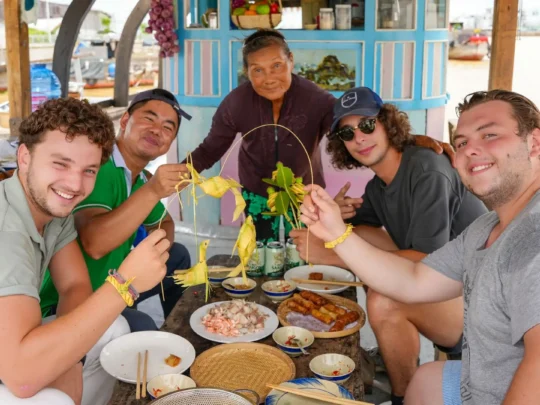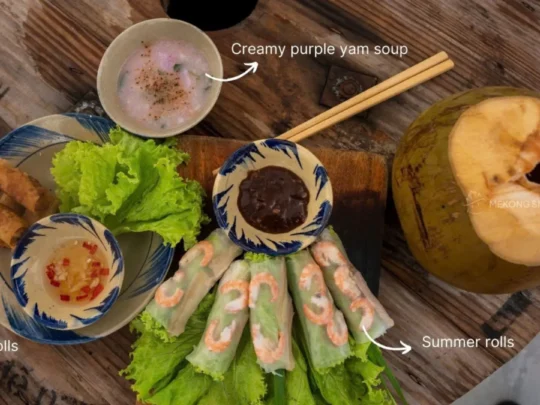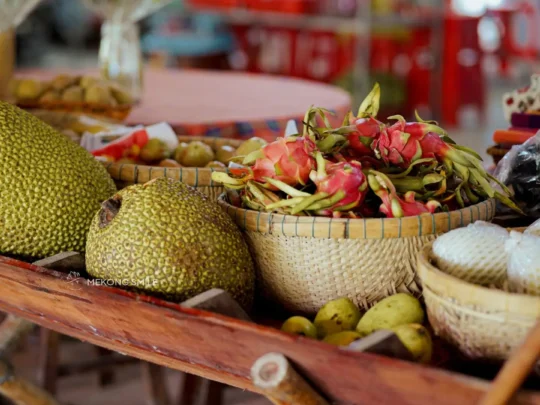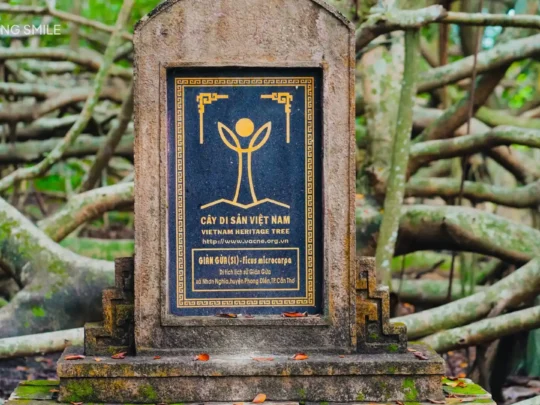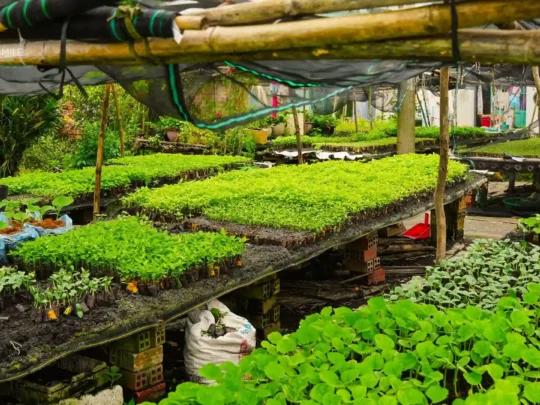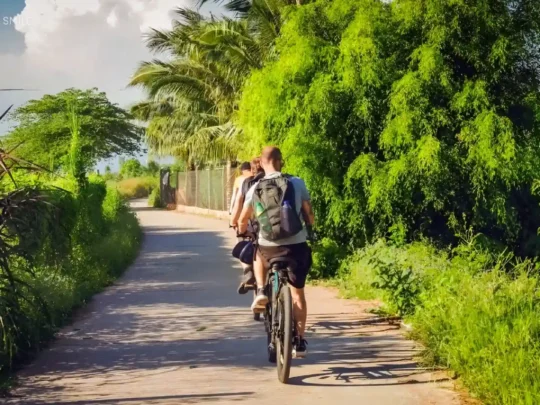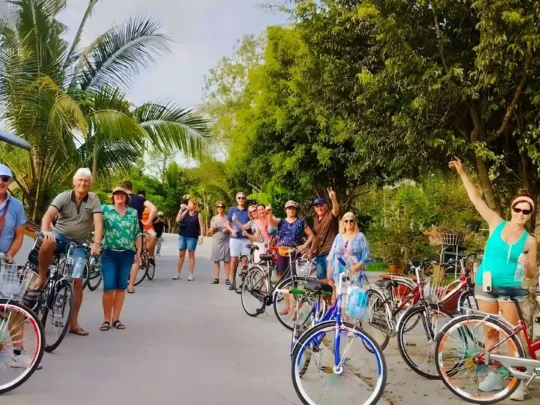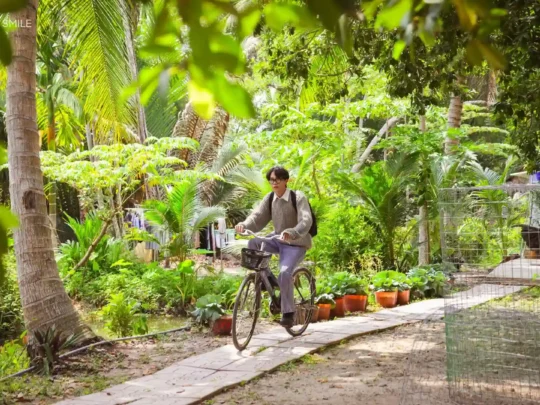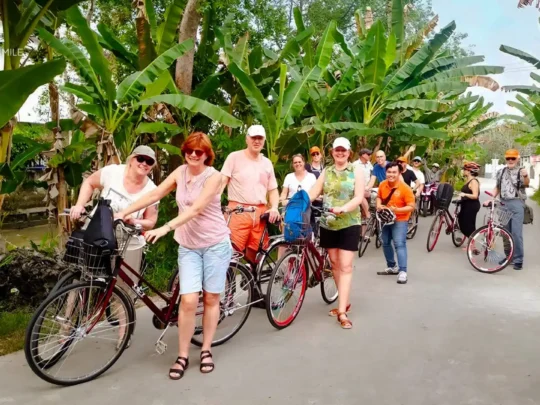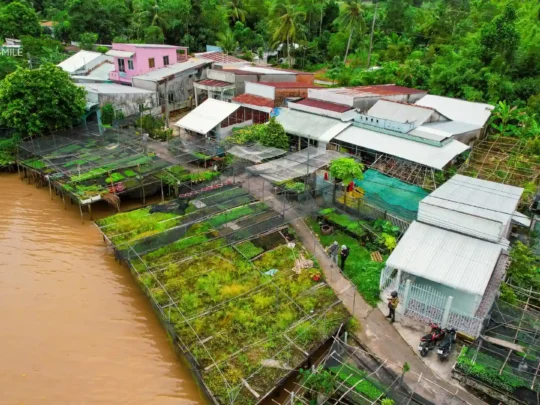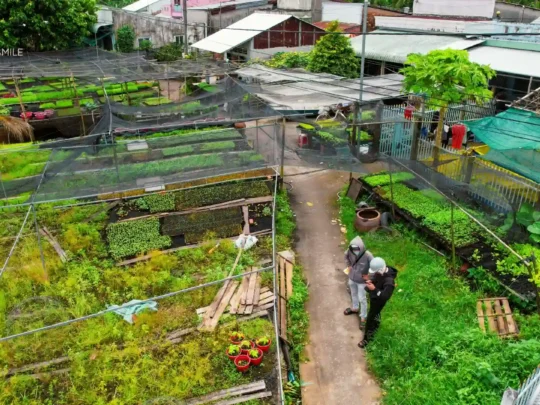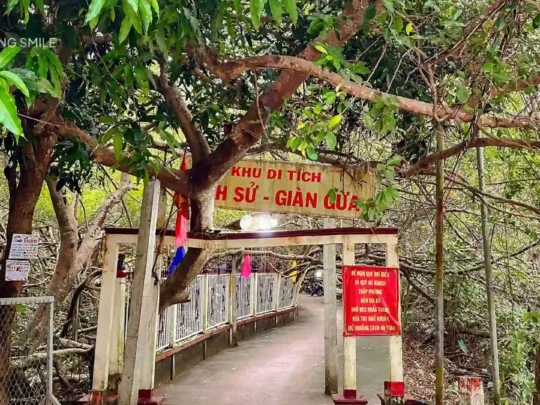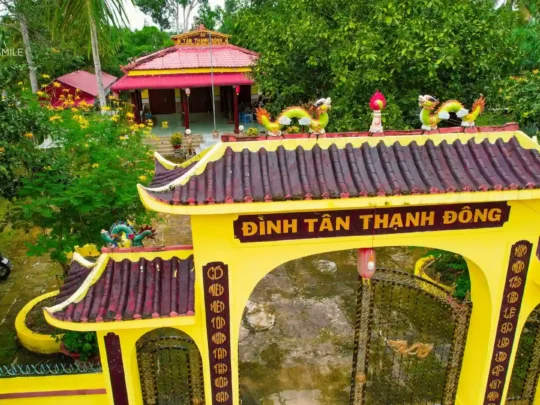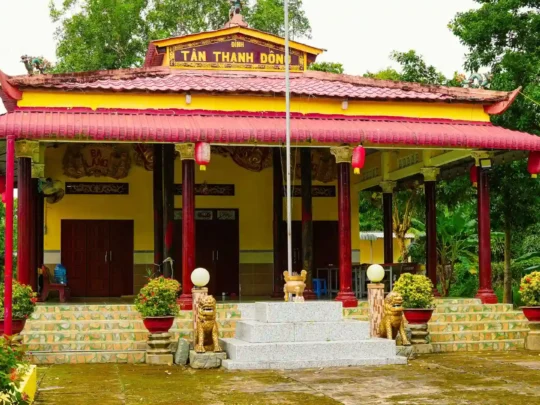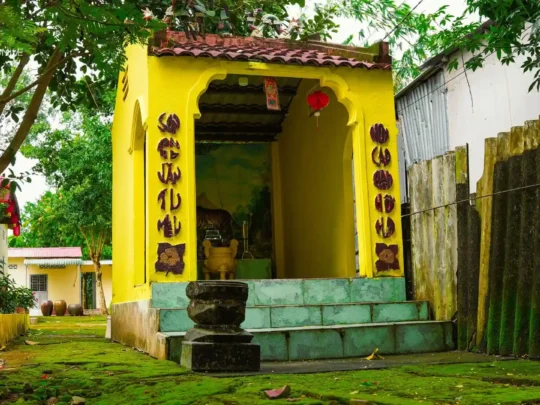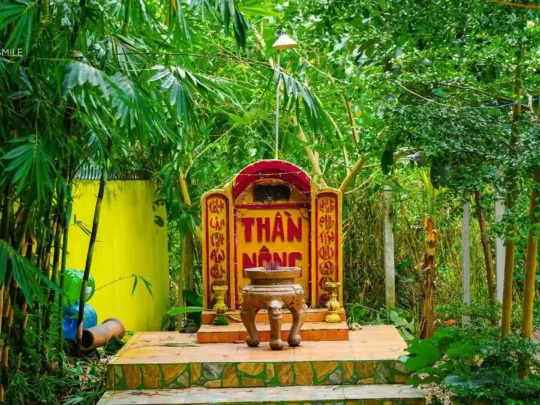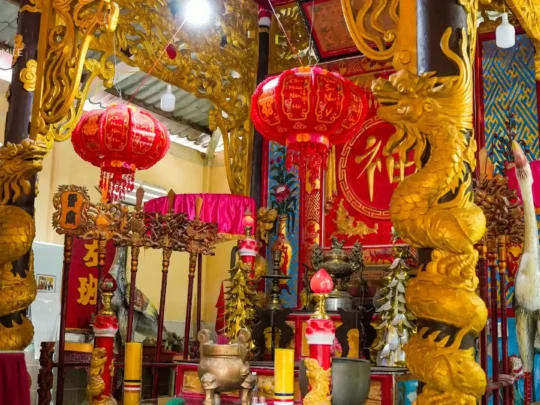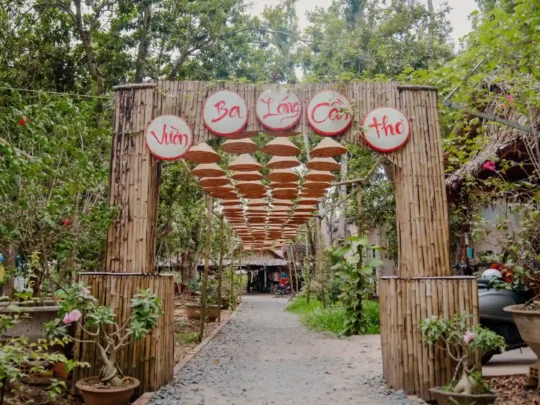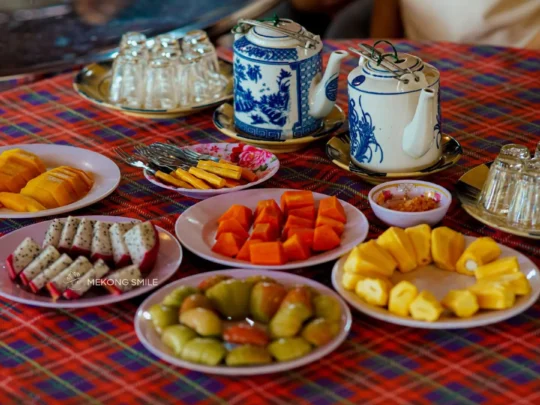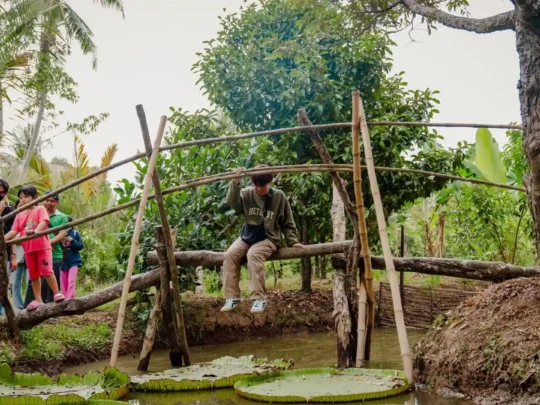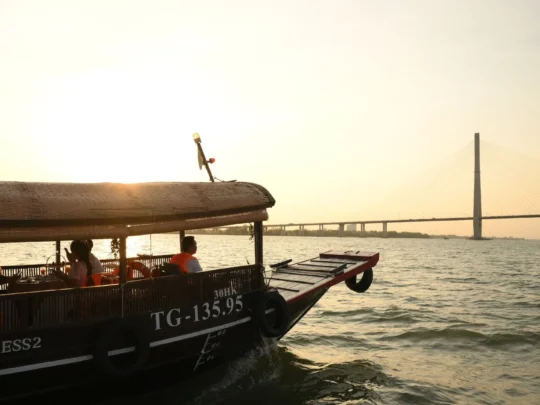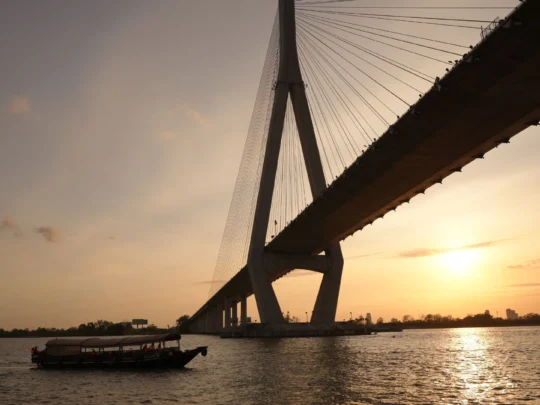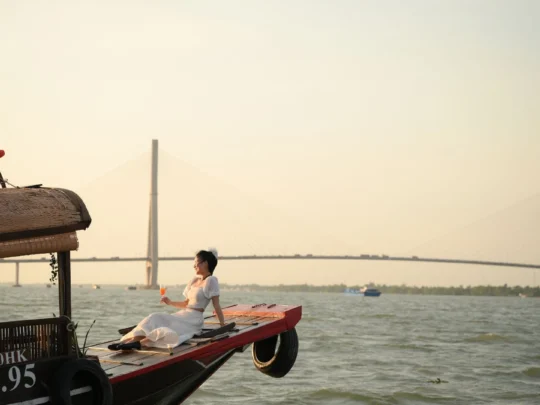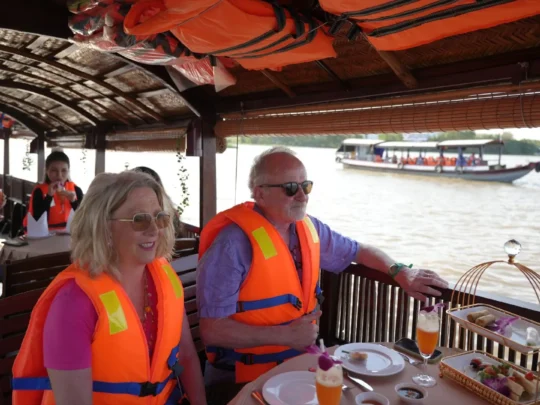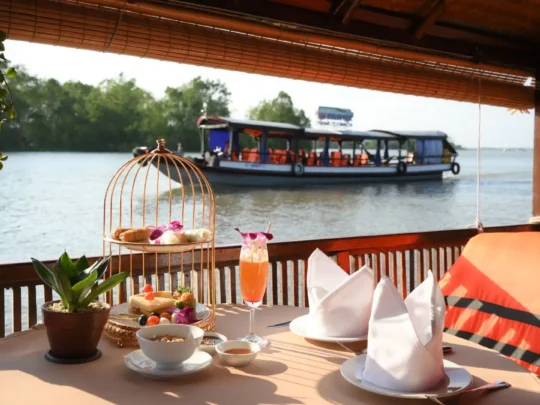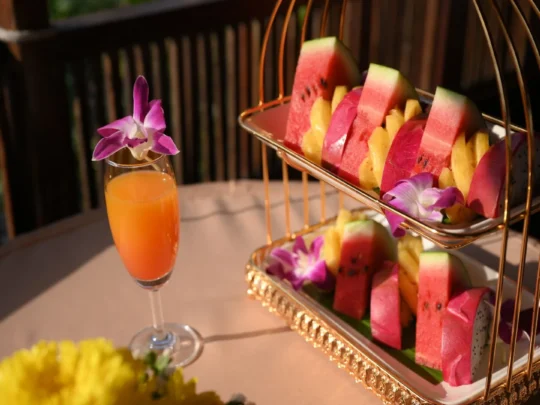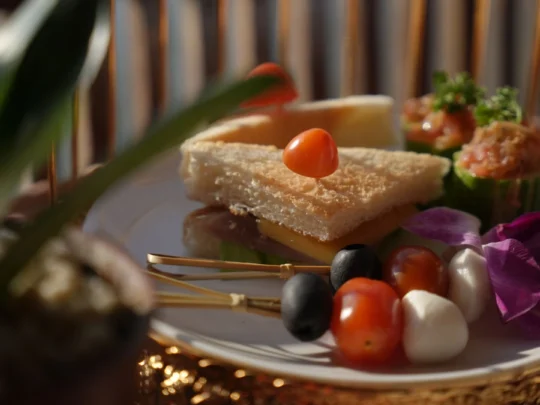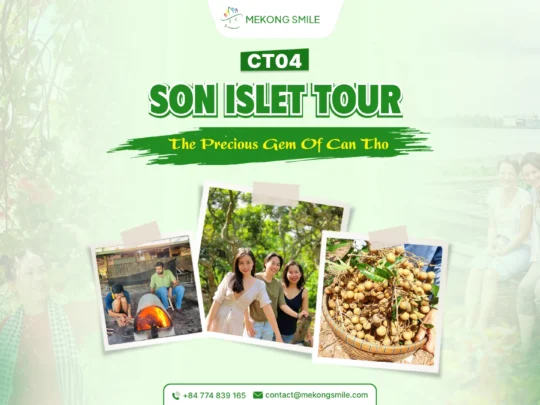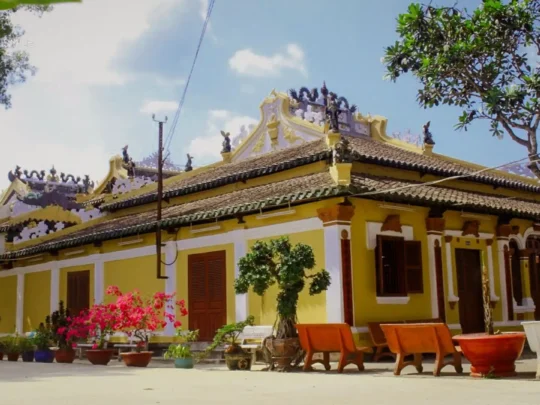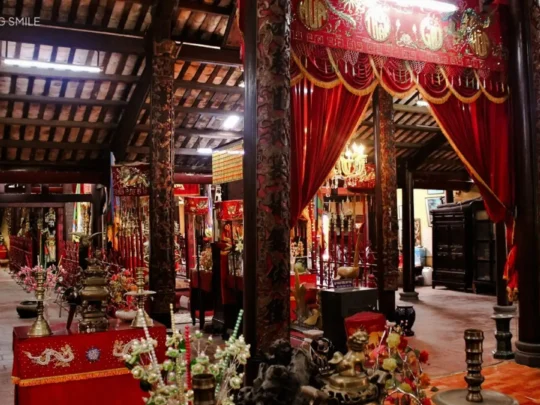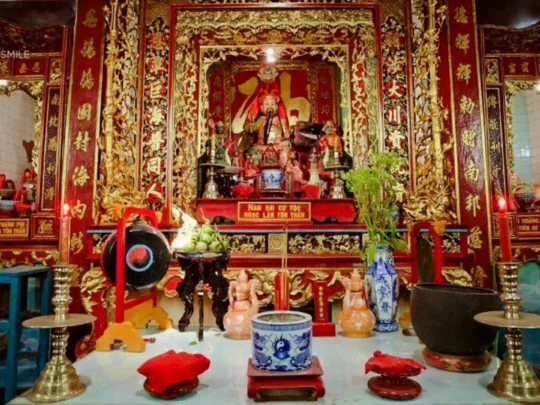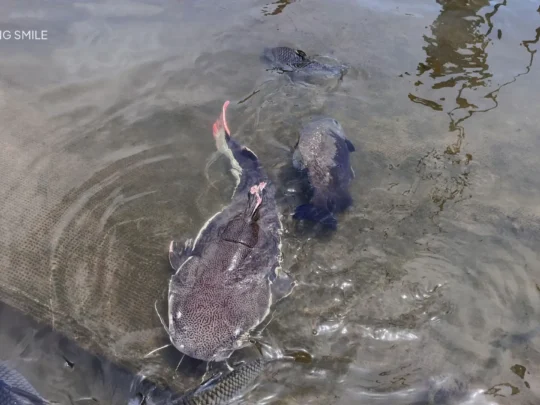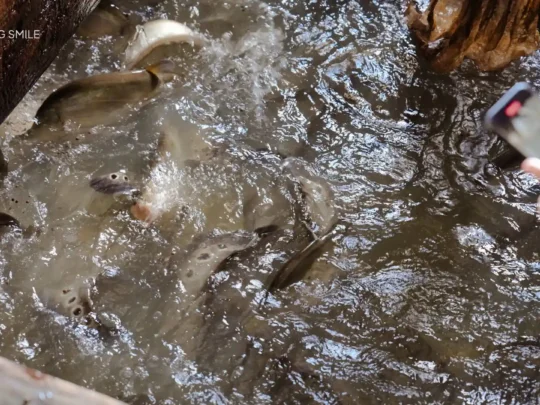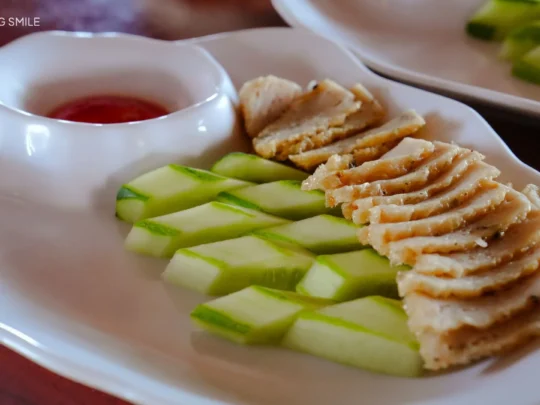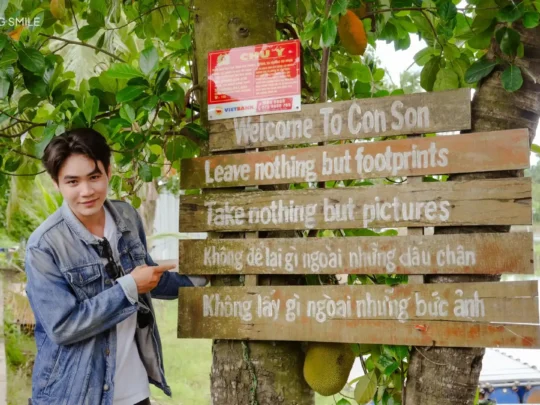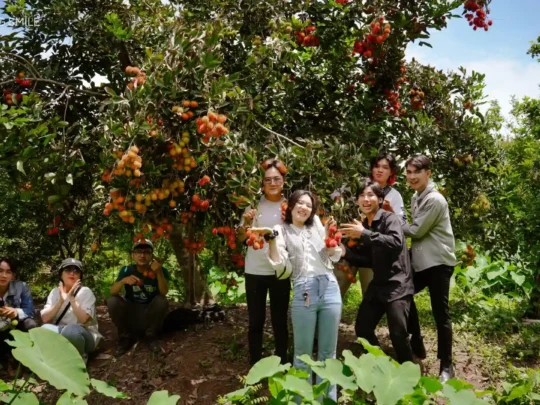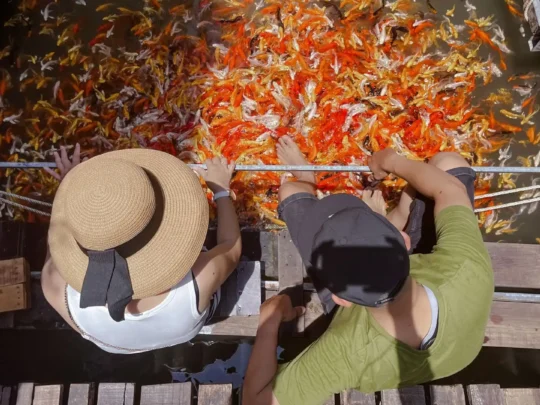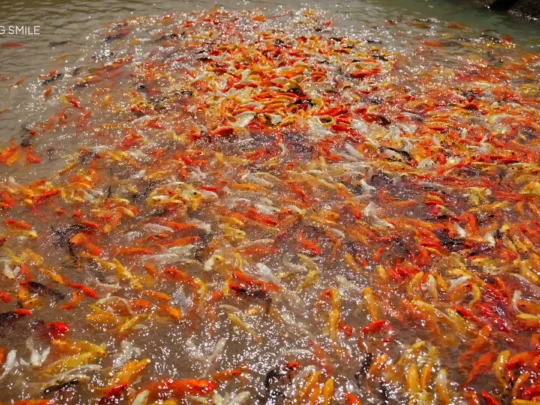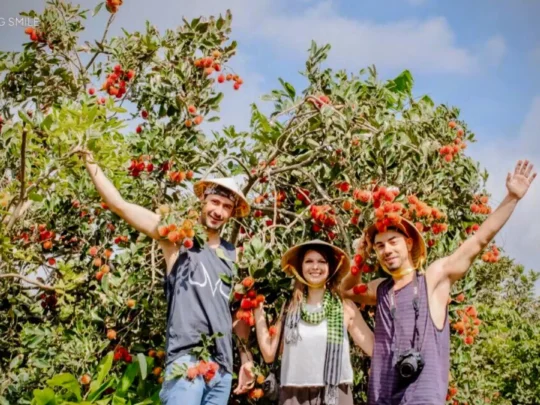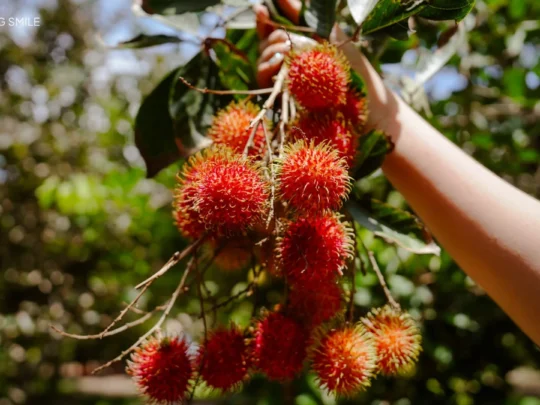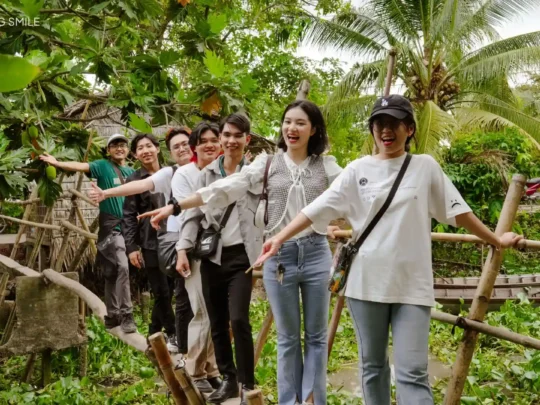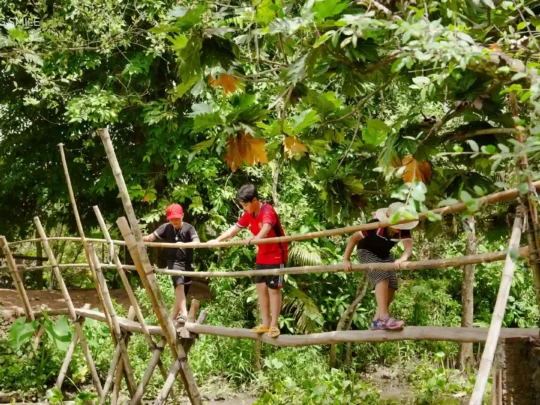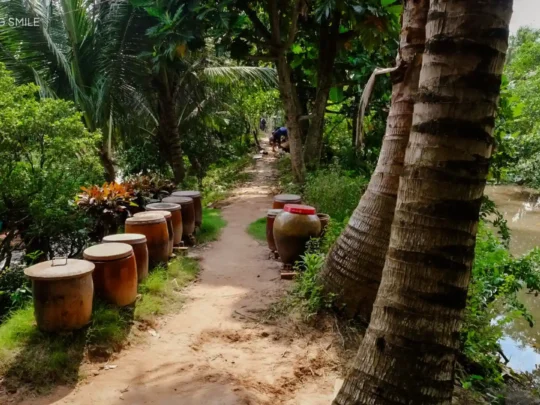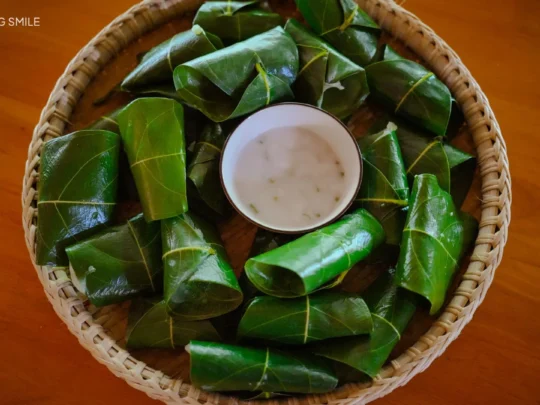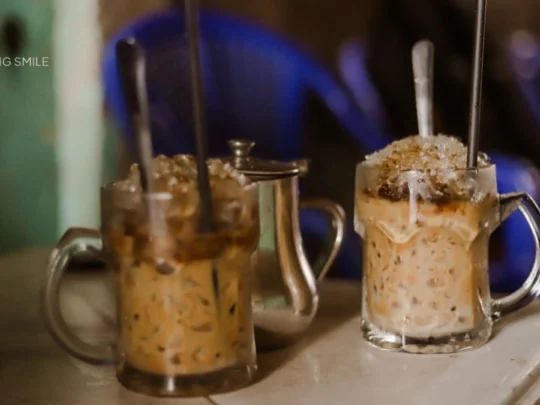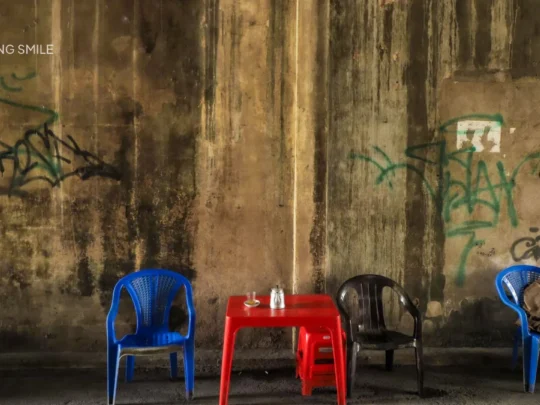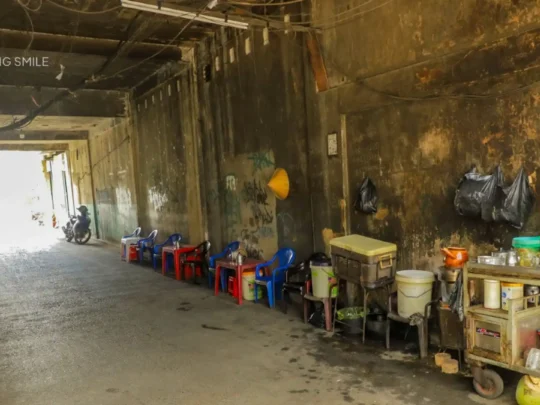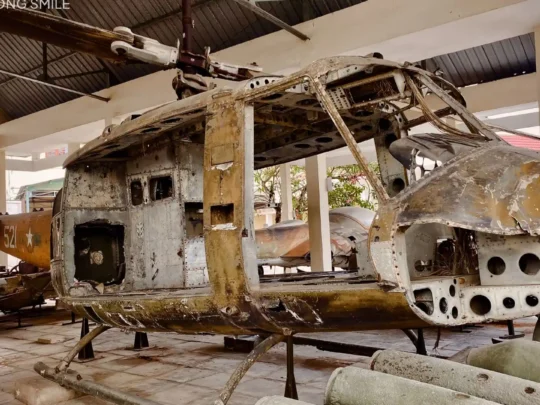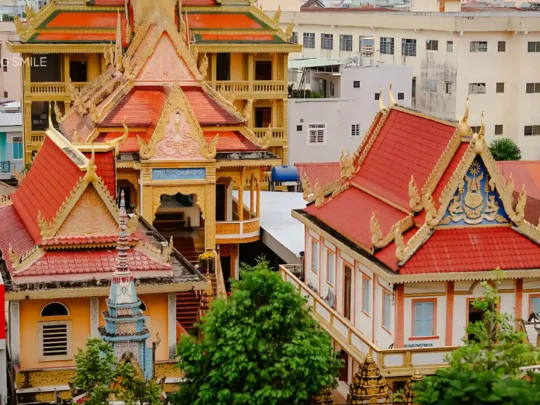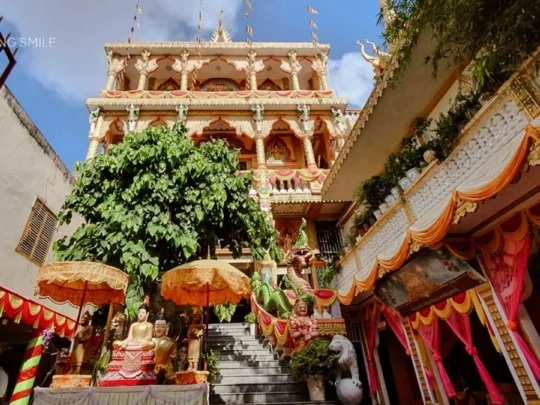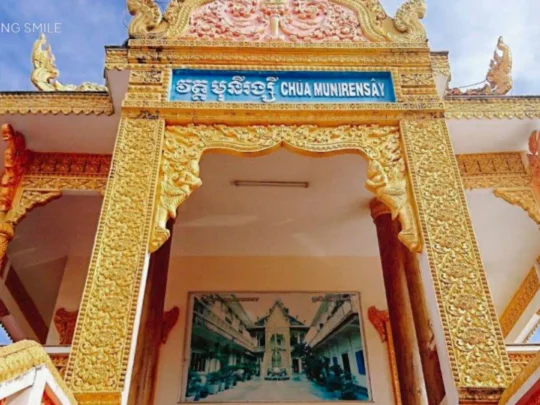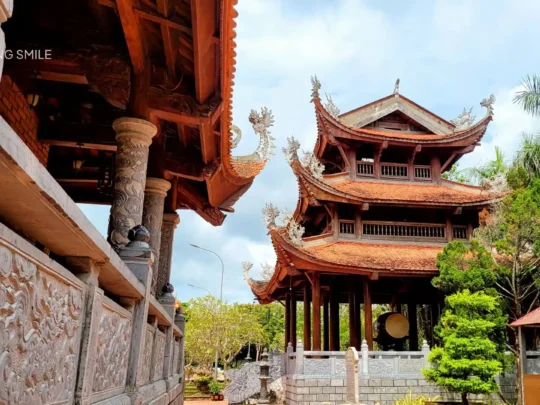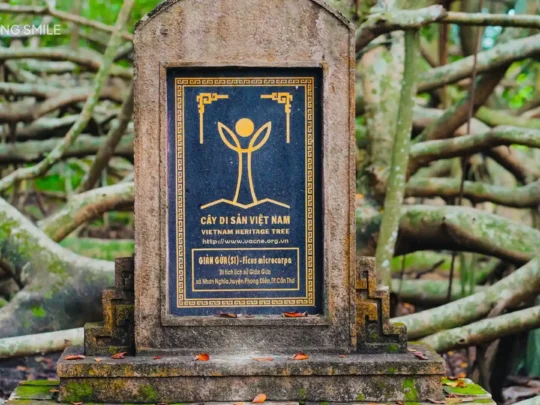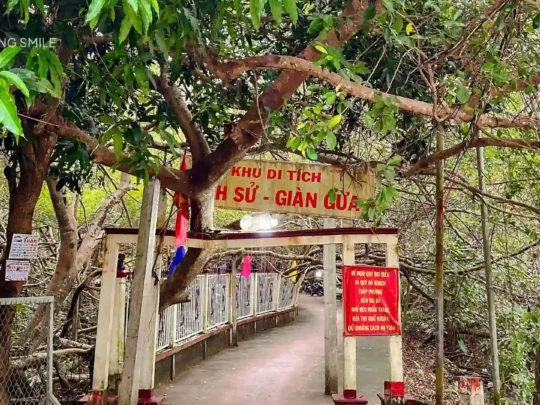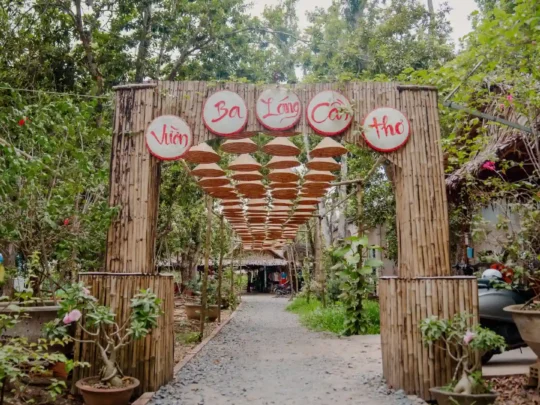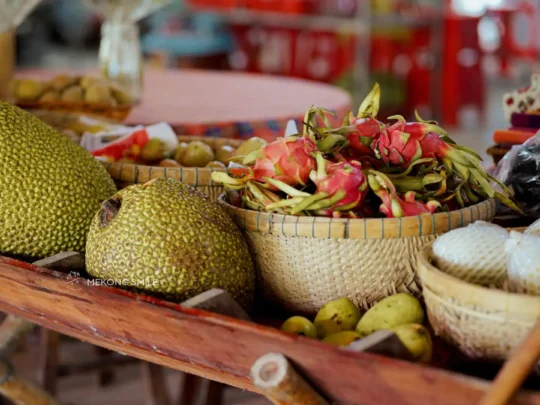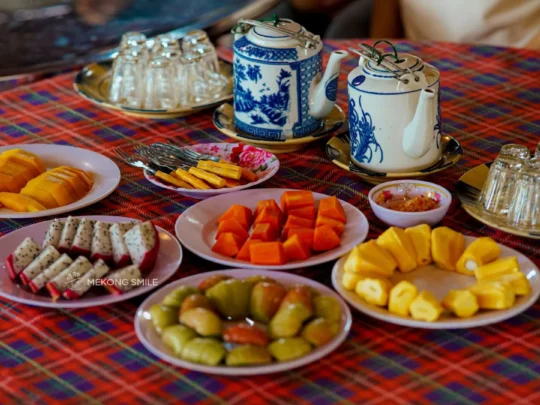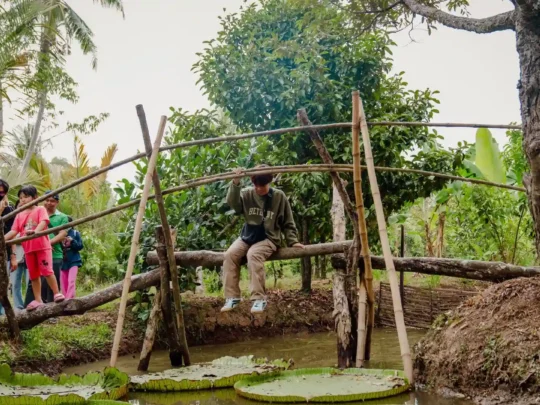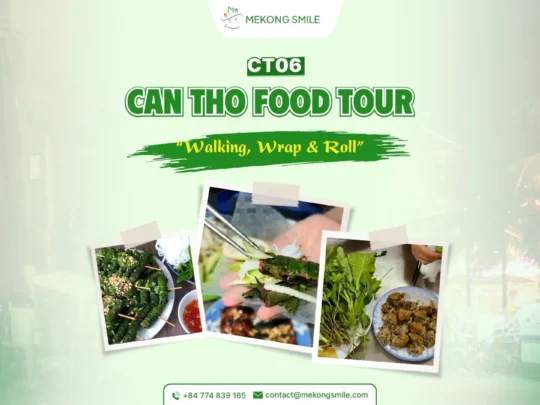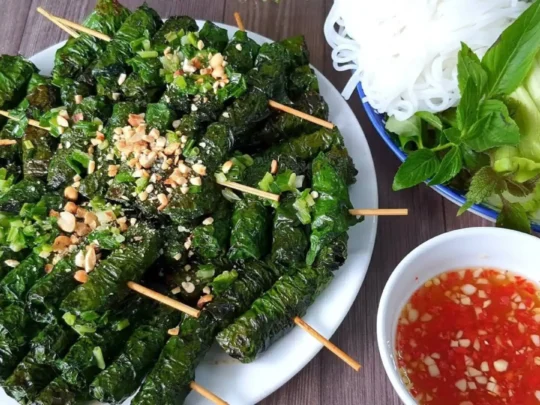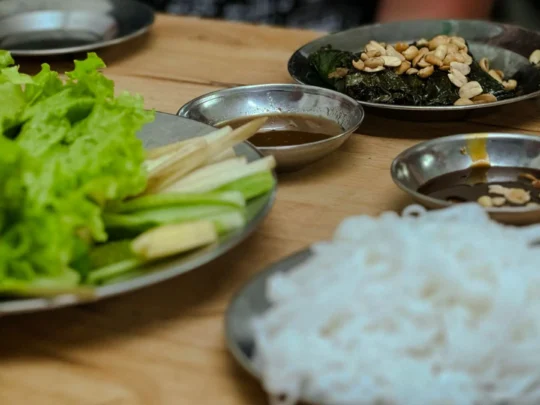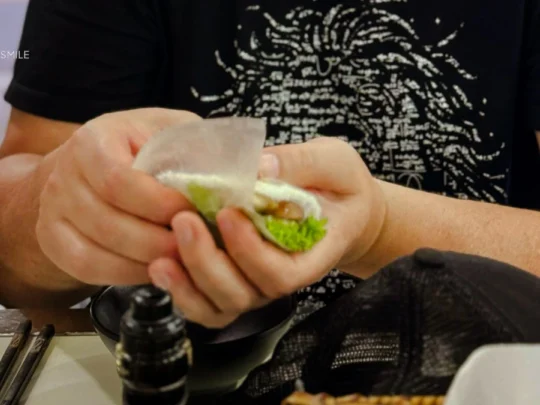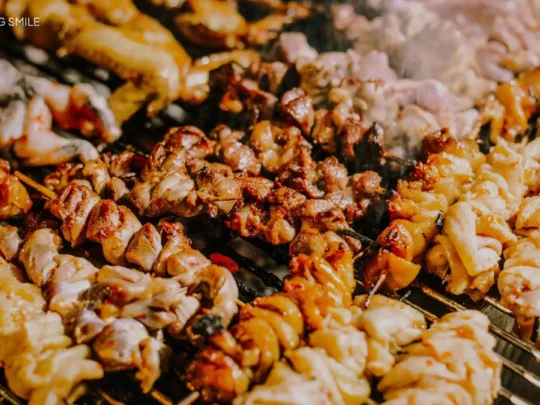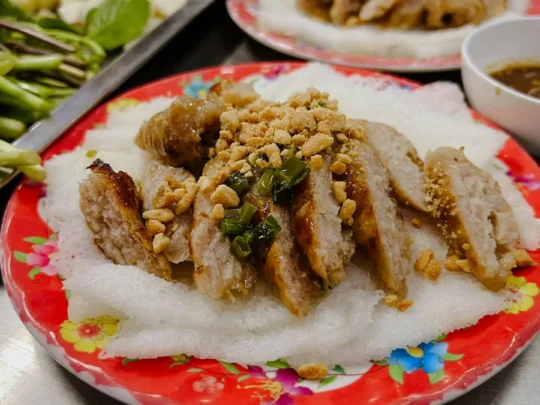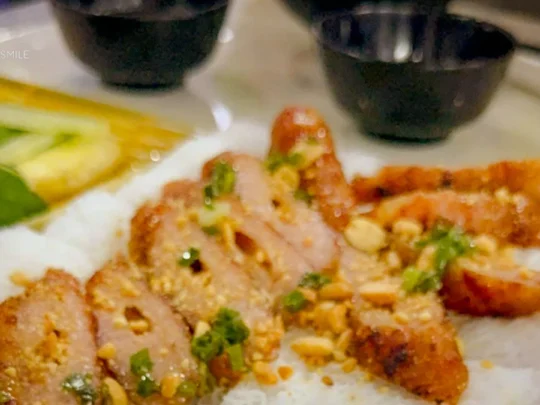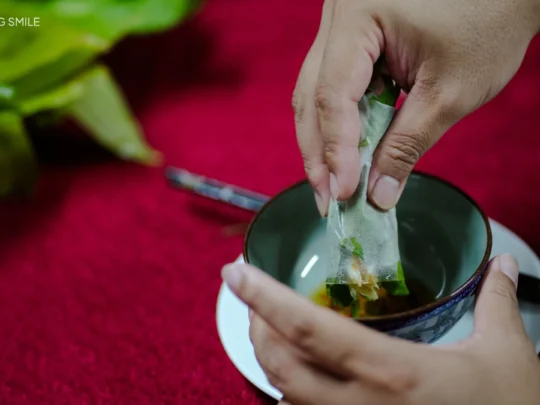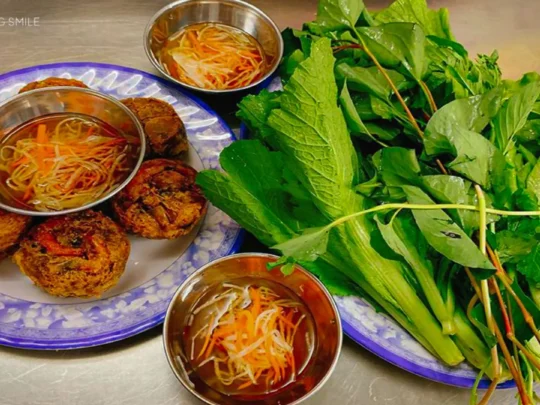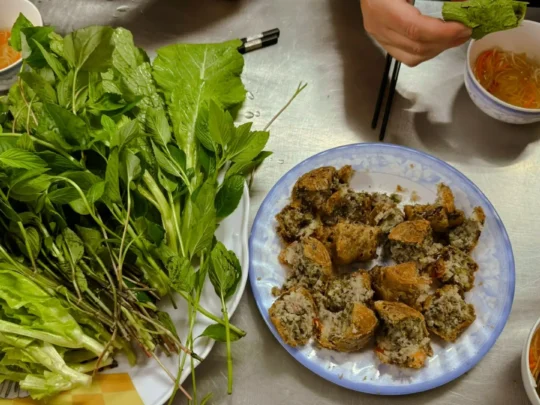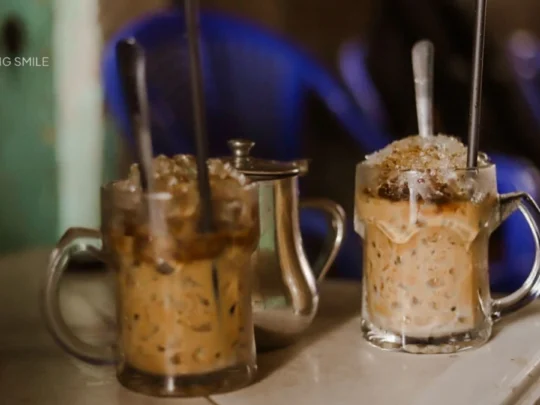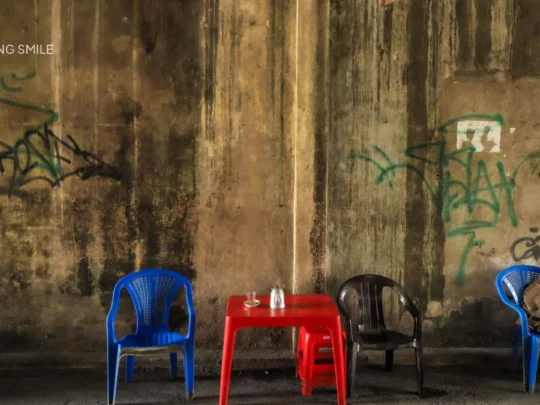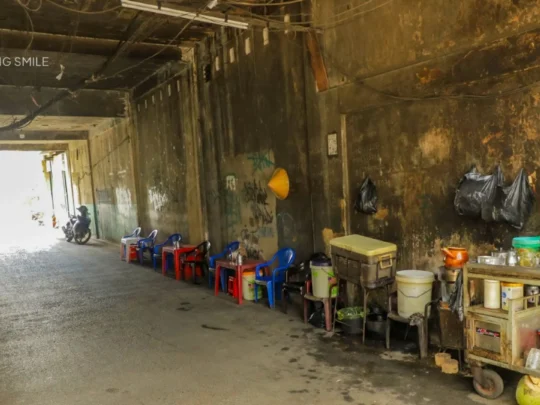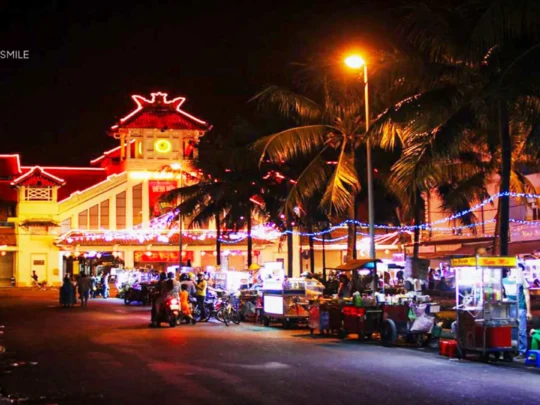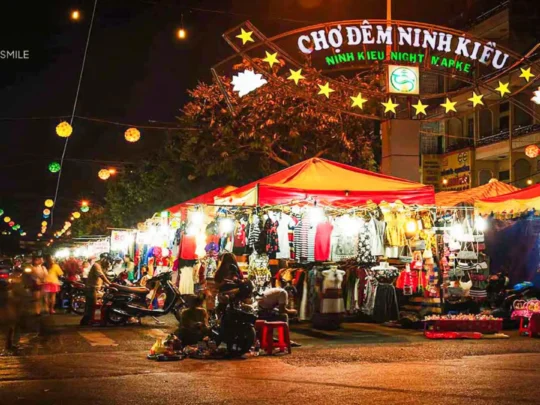Just a short boat ride from Cai Rang Floating Market, Sau Hoai Rice Noodle Factory (Can Tho Rice Noodle Factory) offers travelers a rare opportunity to step inside a living Mekong Delta tradition. This family-run workshop turns simple rice into silky noodles through a fascinating, hands-on process that visitors can watch—and even join. In this complete Sau Hoai Rice Noodle Factory travel guide, you’ll discover how Can Tho’s most famous noodles are made, when to visit, what to try (don’t miss the “rice noodle pizza”), and how to include this stop in your floating market itinerary.
Lastest update by Hai Yen Nguyen at Mekong Smile | Official Can Tho Travel Guide
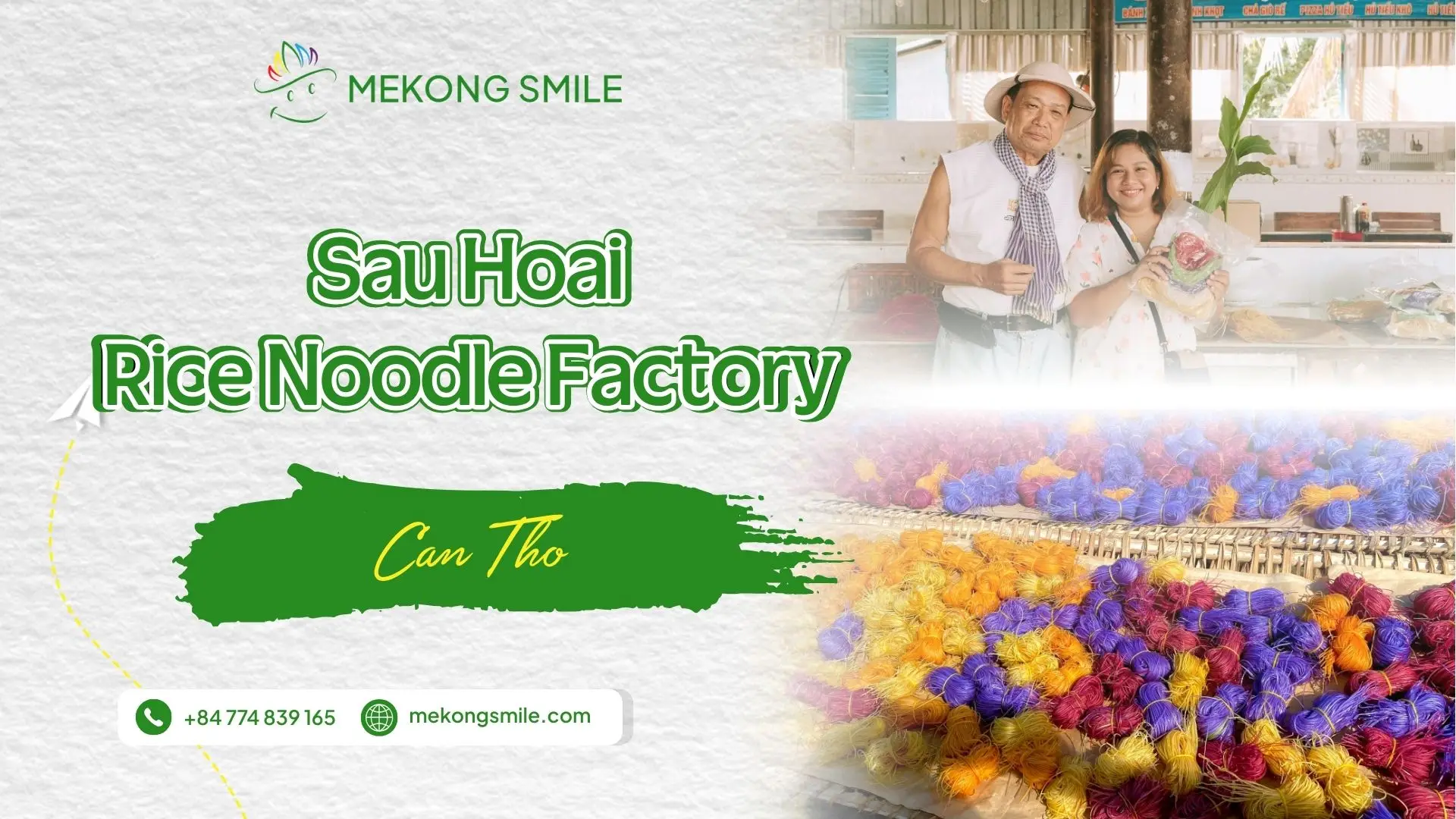
An overview of Can Tho Rice Noodle Factory
A glance at Can Tho Rice Noodle Factory
- Location: 476, 14 Lo Vong Cung, An Binh Ward, Ninh Kieu District, Can Tho City
- Setting: Traditional family-run workshop along Rau Ram canal
- Size: 5,000 square meters (1.2 acres)
- Distance from Can Tho: 7-8 kilometers / 20 minutes
- Distance from Cai Rang Floating Market: 2 kilometers / 5-10 minutes by boat
- Entry: FREE (food and products extra)
- Time needed: 1-1.5 hours
- Peak hours: 5:30-8:00 AM (post-floating market tours)
- Language: English, French, German (Mr. Huynh Ngoc Diep)
- Best known for: Handmade rice noodles, “rice noodle pizza,” hands-on cultural experience
Understanding Can Tho Rice Noodle Factory: A Legacy of Innovation
The story of the Can Tho rice noodle factories—most notably the Sau Hoai workshops—is a tale of “resilience and spirit.” For decades, these families have maintained the traditional method of making Hu Tieu, a staple noodle of Southern Vietnam. Facing competition from industrial factories, these artisans innovated by introducing natural colors from local plants and creating the “Rice Noodle Pizza”—a deep-fried noodle base topped with savory ingredients. This legacy represents the “vibrant living heritage” of Can Tho, showing how a traditional craft can evolve into a global culinary attraction while staying true to its rhythmic, handmade roots.
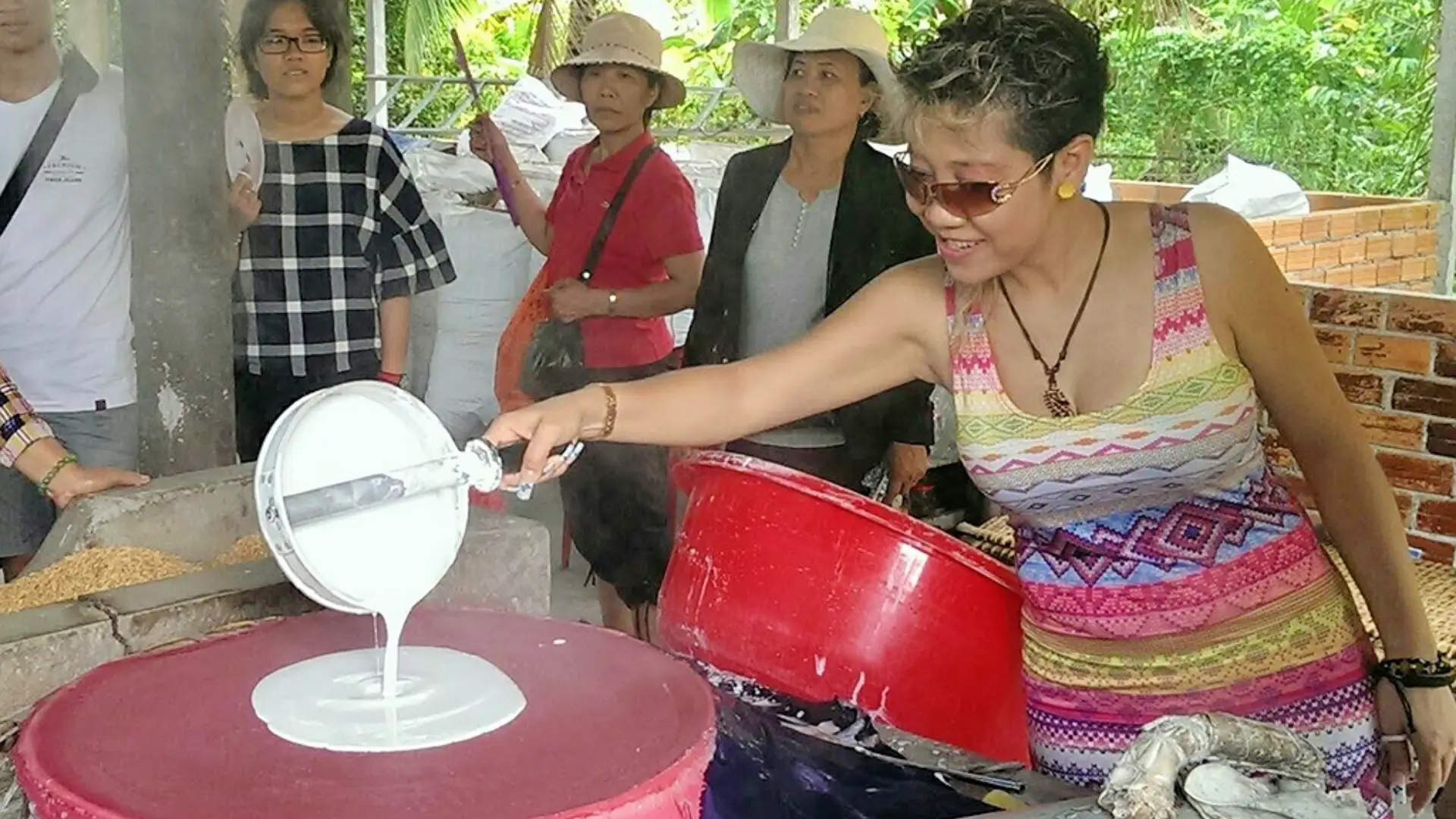
Video: The Rhythm of the Noodle Steam
To witness the incredible speed of the artisans as they lift delicate rice sheets from the steam, watch a cinematic highlights of the workshop:
What Makes Can Tho Rice Noodle Factory Special?
The rice noodle factory is the soul of Can Tho’s culinary ingenuity. It is not just a factory; it is a structural masterpiece of traditional food science adapted to the Mekong lifestyle.
Today, it stands as a symbol of regional creativity. Visitors can observe the unique 5-color noodles made from Gac fruit (orange), Pandan leaves (green), Magenta plant (purple), and Beetroot (red). Observing how the artisans time the drying process on bamboo racks (vỉ)—relying on the “rhythm of the sun”—highlights the deep connection between the local community and the natural environment.
“With Mekong Smile experts, you will discover the technical secret behind the perfect Hu Tieu strand: the Sari Rice. Our experts will explain why this specific dry-texture rice variety from the Delta is essential for creating a noodle that is elastic enough to be sliced but firm enough to hold its shape in a boiling broth.” – Mr. Jimmy, Business Development of Mekong Smile
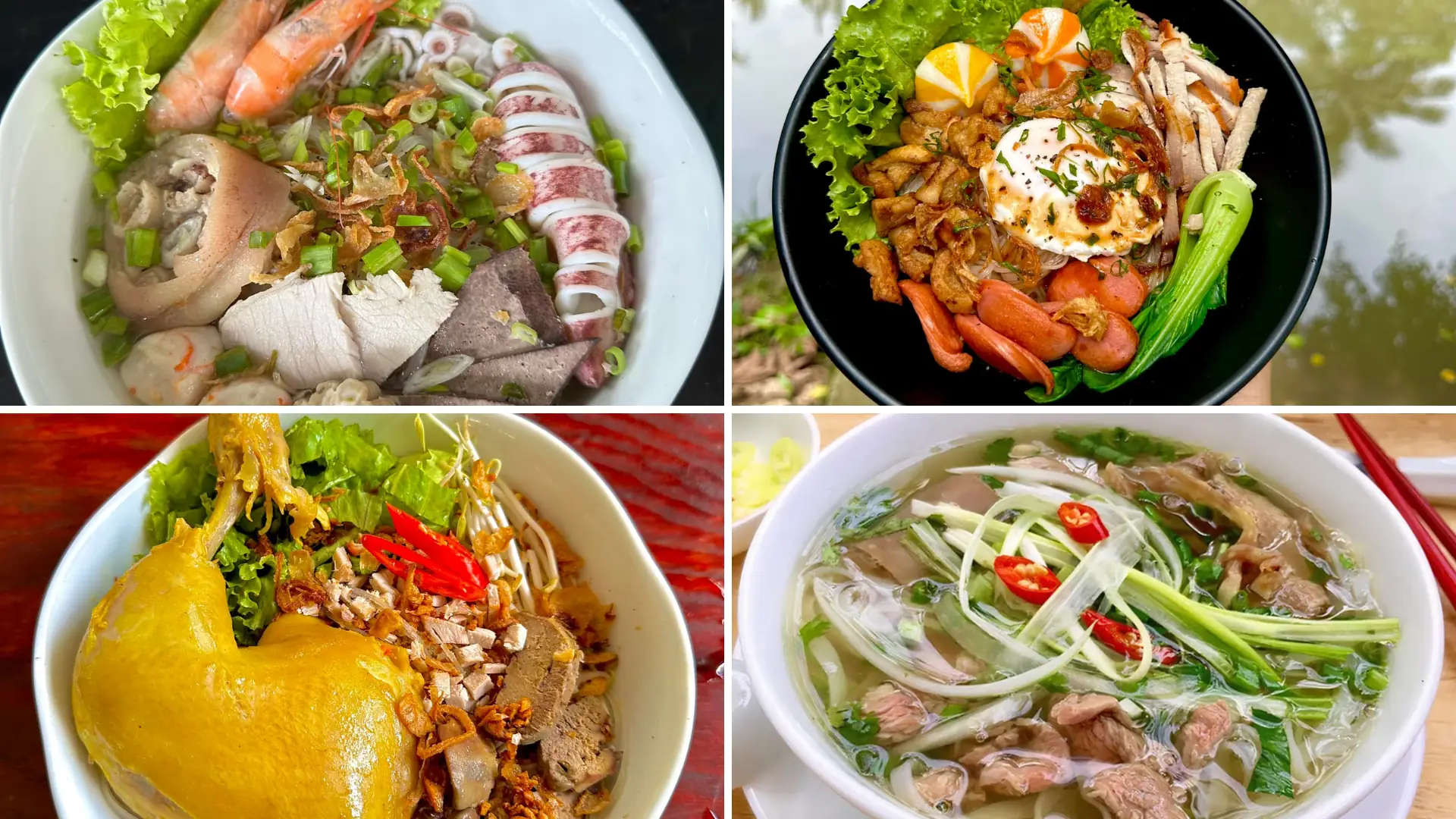
Planning Your Visit: Logistics & Timing
Location
The factories are strategically positioned near the intersection of the city’s major waterways and the “Heritage Route.”
- Exact Address: 476/14, Lo Vong Cung, An Binh Ward, Ninh Kieu District, Can Tho.
- Distance: Approximately 6km from Ninh Kieu Wharf; very close to the Cai Rang Floating Market area.
How to Get There
- By Boat: The most authentic arrival. Combine your trip to the Cai Rang Floating Market with a detour into the small canals to dock directly at the factory’s pier.
- By Land: Easily accessible by taxi, car, or bicycle via the Nguyen Van Cu or Lo Vong Cung roads.
- The Mekong Smile Way: We integrate the noodle factory as a key sensory stop in our Cai Rang Floating Market tour. We arrive just after the market peak, ensuring you see the “roasting and slicing” phase at its most active.
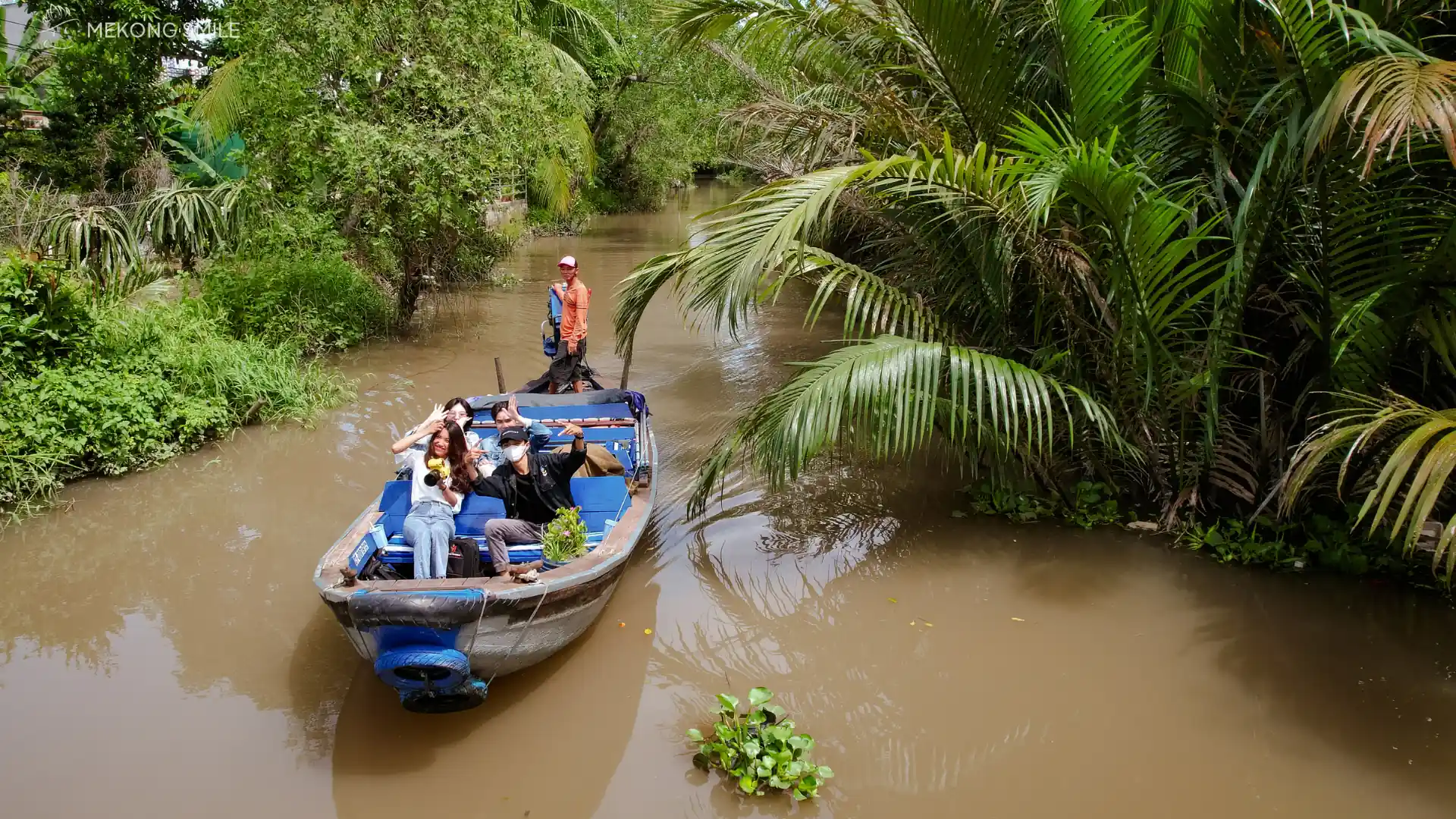
Best Time to Visit
- Operating Hours: 06:00 AM – 05:00 PM (Daily).
- The “Action” Hour: 08:00 – 10:30 AM is peak production time. This is when the steam is highest, and the colorful racks are being moved out to the drying fields.
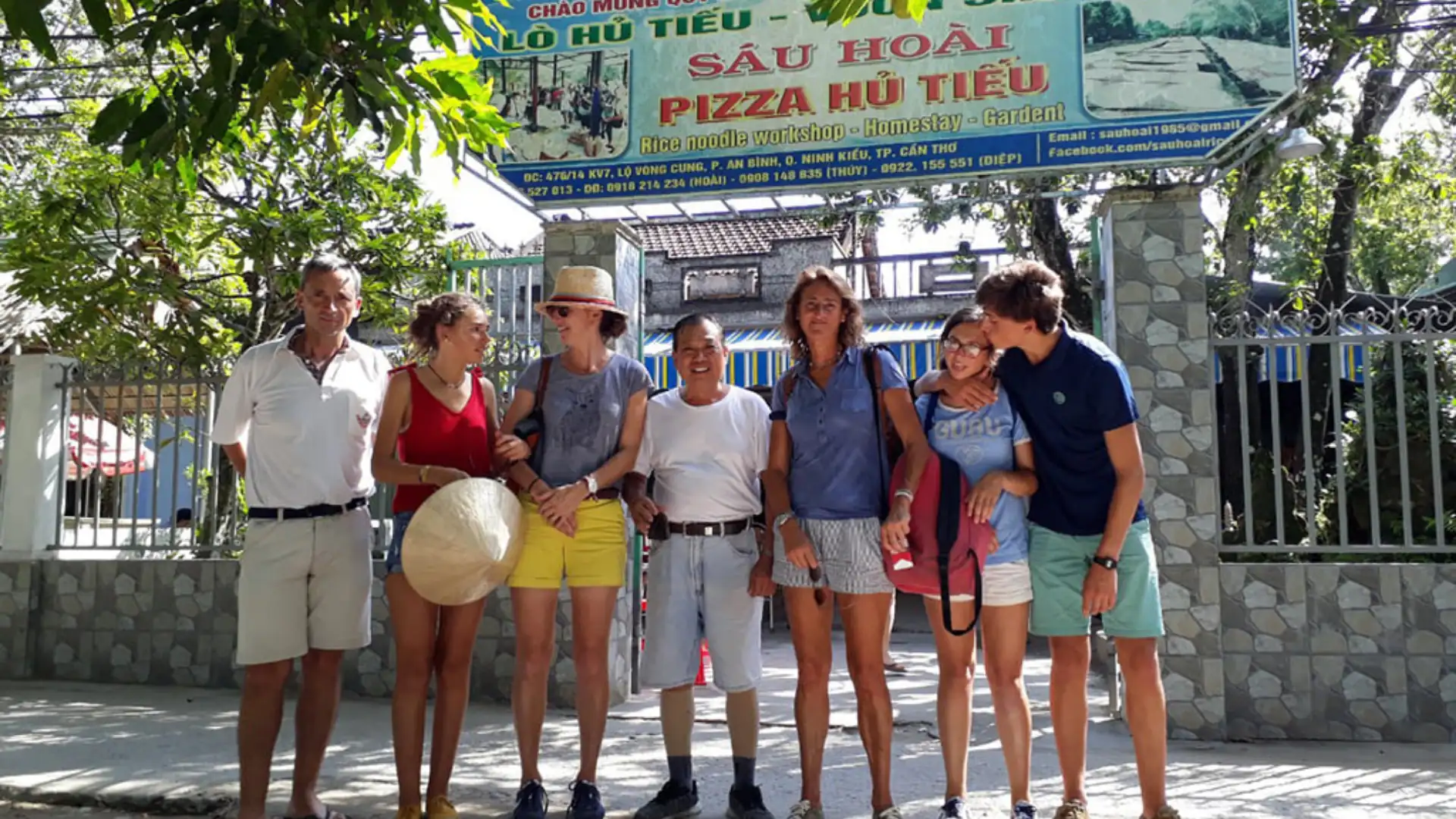
Product & Service Pricing at Rice Noodle Factory
| Item / Service | Estimated Price (VND) | Estimated Price (USD) |
|---|---|---|
| Entrance Fee | Free (Purchases encouraged) | Free |
| Hu Tieu Pizza (Original/Large) | 35,000 - 50,000 VND | $1.50 - $2.00 |
| Pack of 5-Color Dry Noodles | 20,000 - 40,000 VND | $0.80 - $1.60 |
| Hands-on Experience Fee | Included in tour or Tip-based | Tip-based |
| Mekong Smile™ Half-Day Tour | ~850,000 VND | $35.00 |
Note: Prices support the local family workshops directly. Mekong Smile recommends buying a pack of the purple magenta noodles as a unique, lightweight souvenir.
The Experience at Can Tho Rice Noodle Factory
The “Spreading & Lifting” Mastery
Witness the incredible dexterity of the makers. With a single rhythmic motion, they spread the rice batter on a cloth steamer and lift the paper-thin sheet with a bamboo stick. It is a “stork symphony” of movement that requires years of muscle memory.
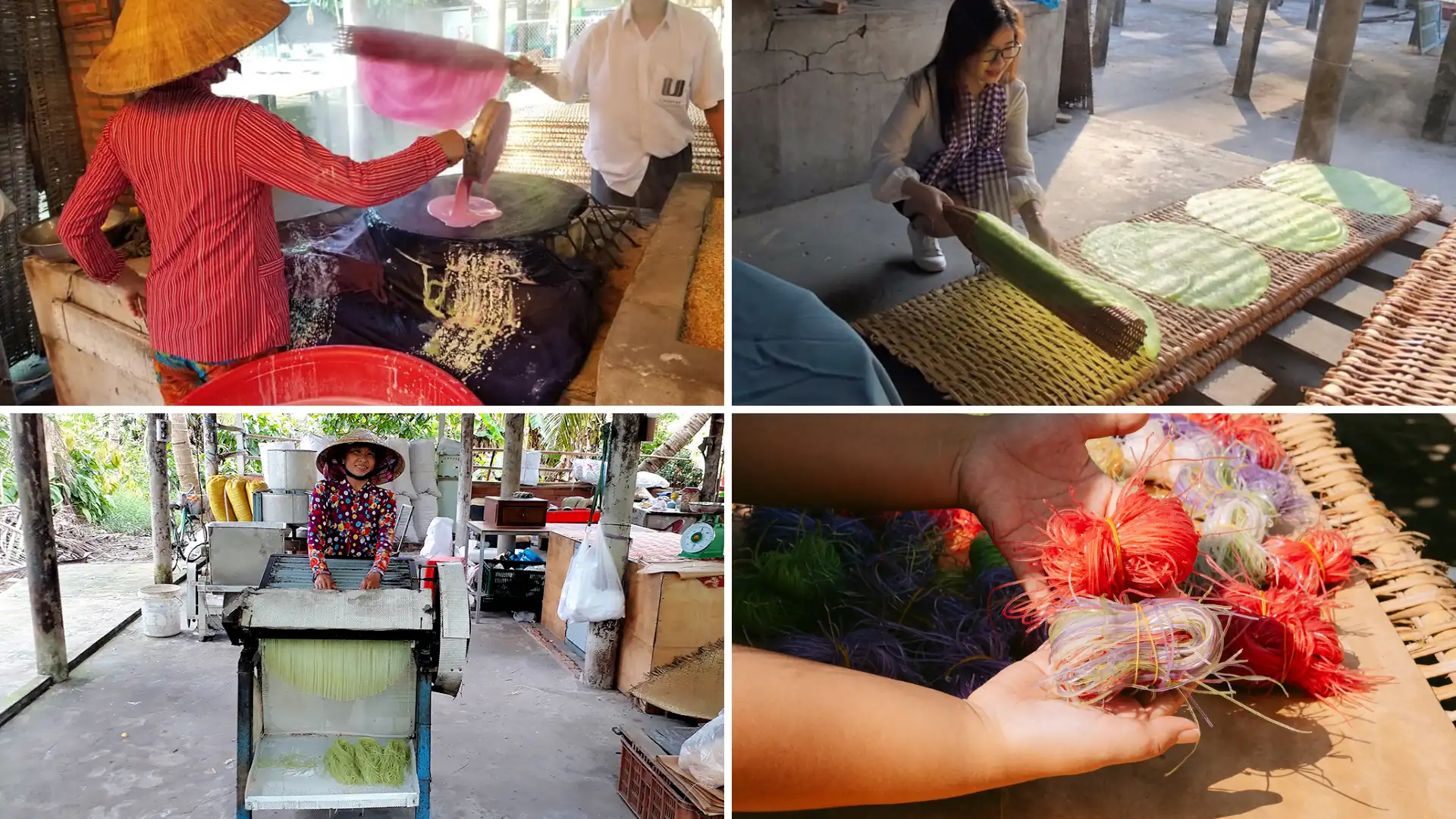
Hands-on Noodle Workshop
Under the guidance of Mekong Smile™ experts, try your hand at lifting the sheets or feeding the dried rice cakes into the slicing machine. You will quickly learn that the “resilient spirit” of the makers is matched by their incredible physical endurance.
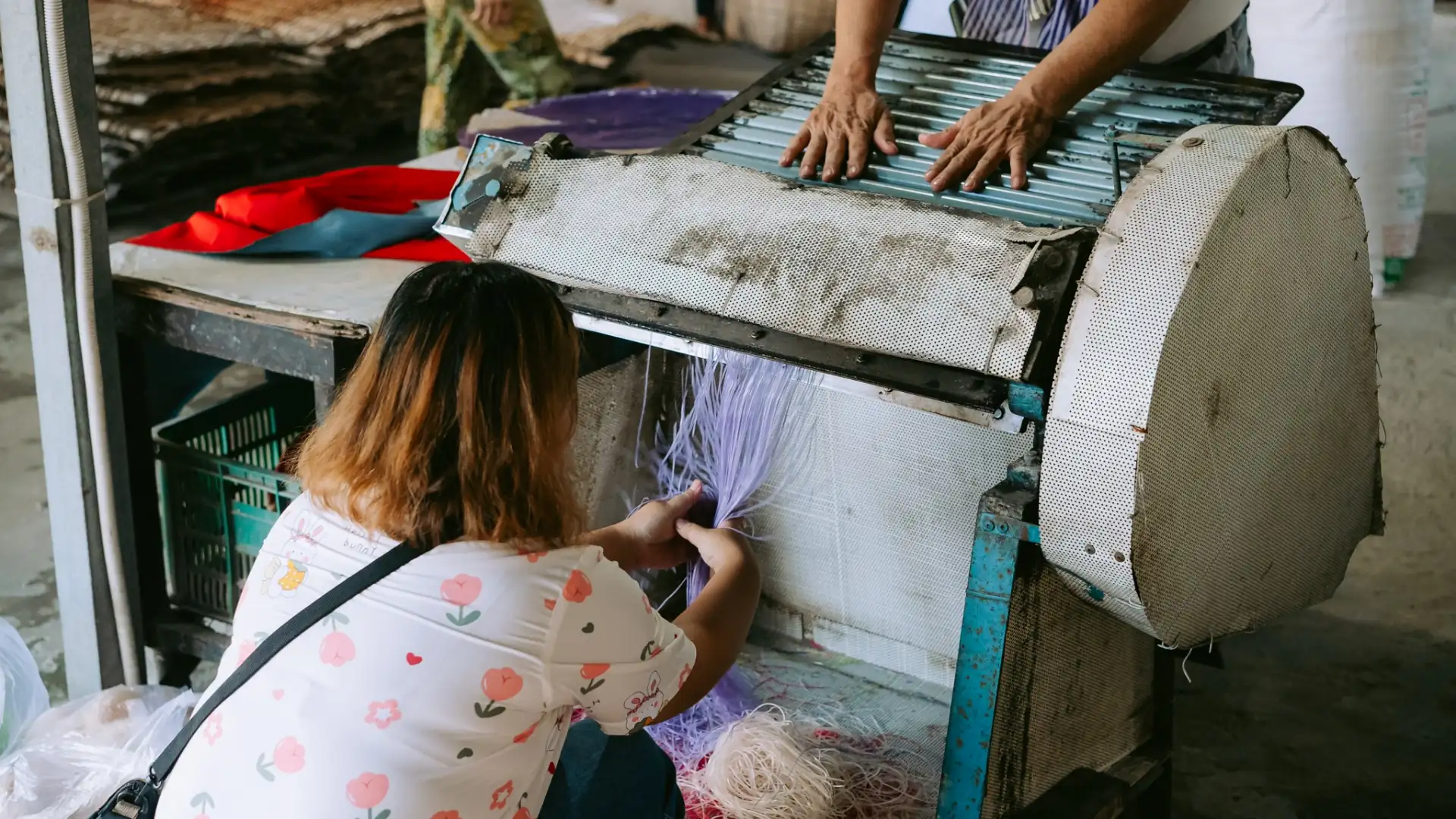
The “Noodle Pizza” Tasting
Experience the flavor of innovation. Try the iconic Rice Noodle Pizza—crispy, savory, and uniquely Can Tho. Topped with eggs, braised meat, and herbs, it’s a “touch of identity” that has captured the hearts of food travelers worldwide.
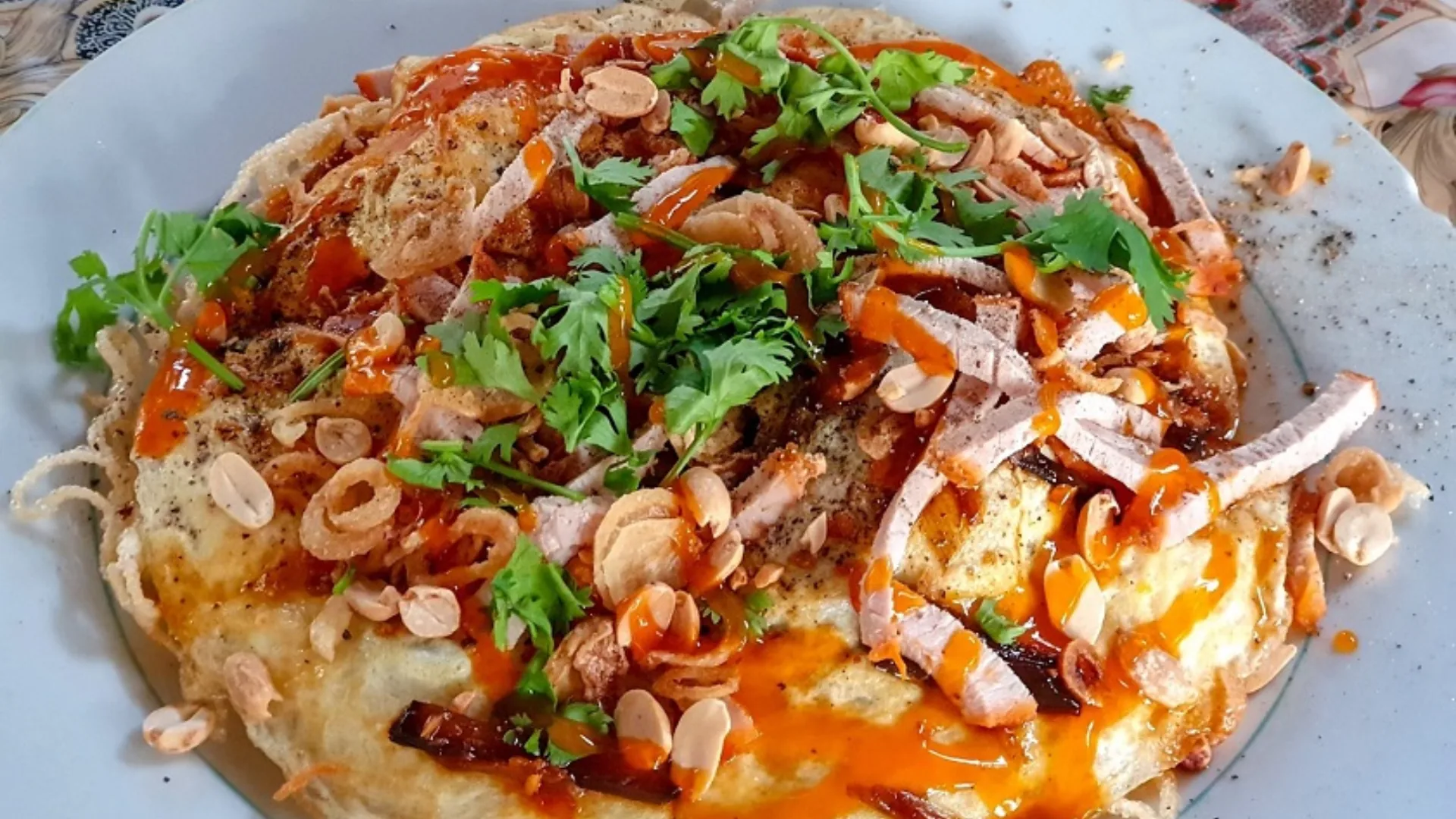
Exploring the 5-Color Drying Racks
Walk through rows of bamboo racks displaying a rainbow of noodles. These are perfect for photography, offering a stunning visual contrast between the bright natural dyes and the rustic wooden workshop.
Authentic Images at Sau Hoai Noodle Factory
Combining the Factory with Can Tho’s Hidden Gems
The noodle factory is perfectly located for a full day of discovery. Start your morning at the Cai Rang Floating Market, then take a 10-minute boat ride to the factory. Afterward, continue to the Can Tho Cacao Garden to see artisan chocolate making or explore the Bao Gia Trang Vien Ecological Garden for adventure. To fully experience the “Western Capital,” extend your journey to the architectural masterpiece of the Binh Thuy Ancient House or the grand Hung King Temple. For an urban cultural immersion, wander through Ninh Kieu Wharf, cross the Can Tho Pedestrian Bridge, and visit the Can Tho Museum, the Can Tho Prison, or the mystical Can Tho Tarot Museum. Nature lovers should not miss the “flying fish” at Son Islet (Con Son), the Can Tho Floating Fish Farm, or the sunset symphony at Bang Lang Stork Garden. For spiritual seekers, find peace at the Truc Lam Phuong Nam Zen Monastery or the Ong Pagoda. This combination ensures a journey that captures the full spectrum of the Delta’s culinary, agricultural, and historical soul.
Our Signature Can Tho Tours
Experience the best of the city’s culinary heart with our curated journeys:
- Can Tho Rural Tour: A transformative journey into the heart of agricultural life, featuring artisan workshops and intimate interactions with local craft communities.
- Cai Rang Floating Market Tour: Witness the market’s awakening, enjoy breakfast on the water, and decode the secrets of the noodle factory from a traditional boat.
- Can Tho City Tour: Uncover the multi-ethnic spirit and historical architectural elegance of Can Tho, featuring hidden gems and city secrets.
- Can Tho Floating Market & Fruit Garden Tour: The perfect blend of the market’s high energy and the serene, organic tranquility of lush orchards and noodle workshops.
- Can Tho Motorbike Tour: Zip through hidden alleys and rural paths on a motorbike to experience the most authentic corners of Can Tho like a true local.
- Can Tho River Tour: A panoramic journey along the Mekong’s main artery, observing the rhythmic pulse of riverside life and artisanal heritage.
Ready for the Real Mekong? Book Your Authentic Tour Today
Planning Your Mekong Trip?
Get a free, personalized itinerary from our local experts in under 120 minutes.

Instant WhatsApp Support

100% Tailor-made Itinerary
Get a Free Consultation
Leave your contact, we handle the rest.
Frequently Asked Questions (FAQs) about Sau Hoai Rice Noodle Factory
What is Sau Hoai Rice Noodle Factory?
A traditional family-run rice noodle workshop where you watch and participate in handmade noodle-making from rice to finished product. Located 2 km from Cai Rang Floating Market.
How much does Sau Hoai Rice Noodle Factory cost?
FREE entry. Food 30,000-60,000 VND, souvenirs extra. Usually included in floating market tour packages (200,000-400,000 VND total).
What is rice noodle pizza?
Crispy fried rice noodles topped with braised pork, egg, peanuts, and coconut sauce. Sounds weird, tastes amazing. Signature dish created from tourist-local interaction.
Is English spoken at Sau Hoai Rice Noodle Factory?
Yes. Mr. Huynh Ngoc Diep speaks English, French, and German. Process is visual so language barriers are manageable.
What should I bring when I go to Sau Hoai Rice Noodle Factory?
Cash (no cards), camera, comfortable clothes (expect flour dust), sun protection. That’s it.
Can I visit Sau Hoai Rice Noodle Factory without a tour?
Yes, but tours are easier. Most combine with Cai Rang Floating Market for better value and arrive during peak production time.
Is it too touristy at Sau Hoai Rice Noodle Factory ?
It’s popular (hundreds visit daily), but the noodle-making is genuinely traditional and the family sincerely passionate. Tourist-friendly without being fake.

